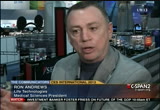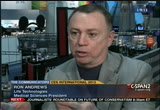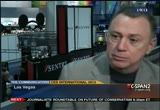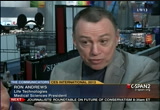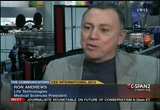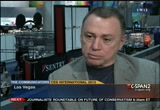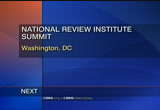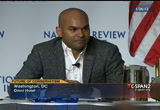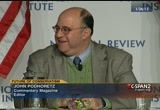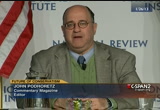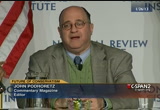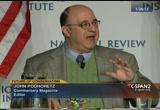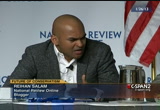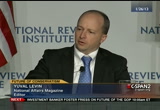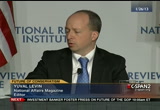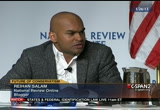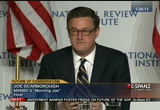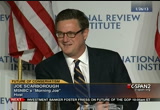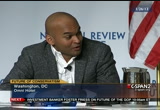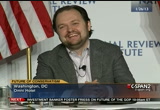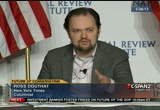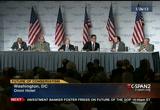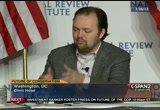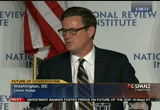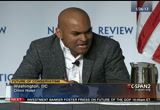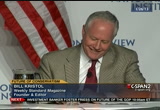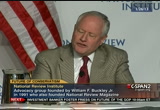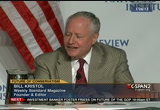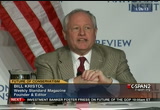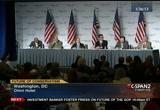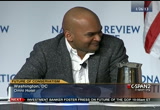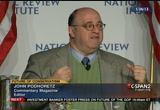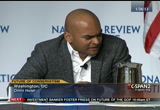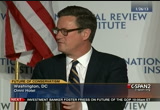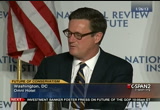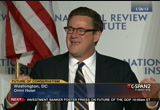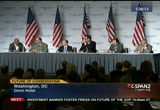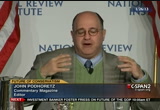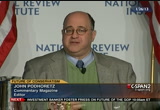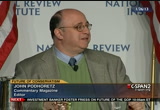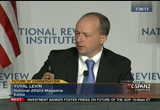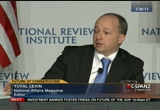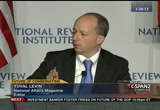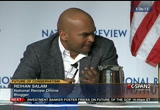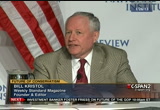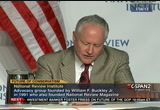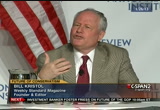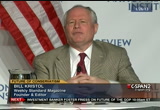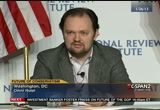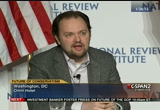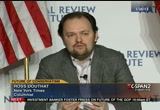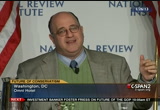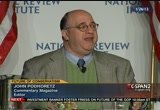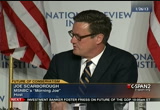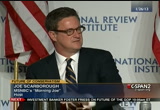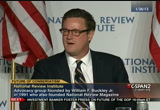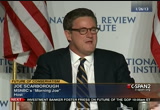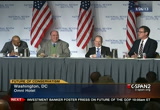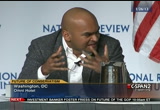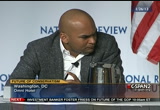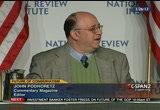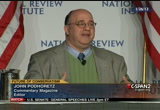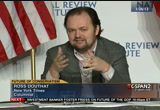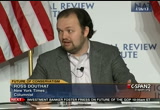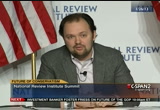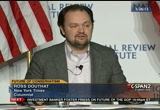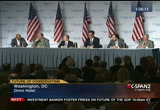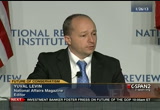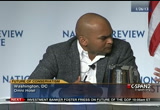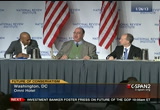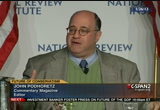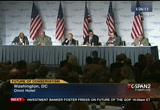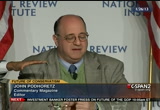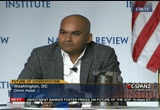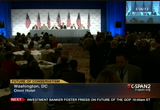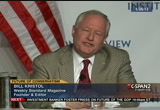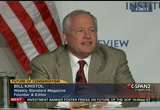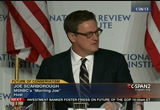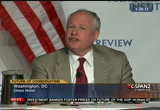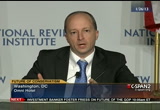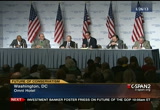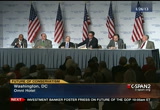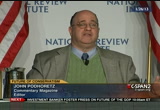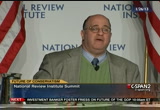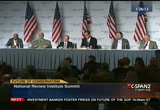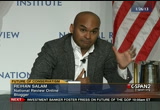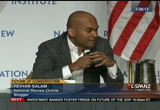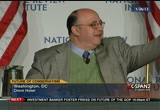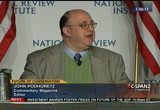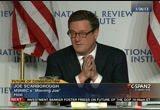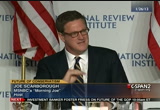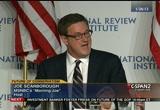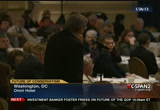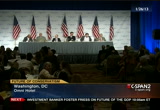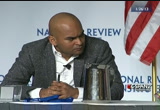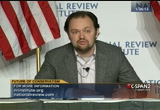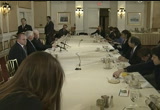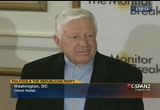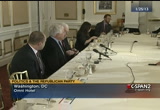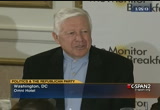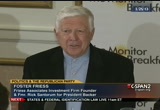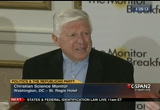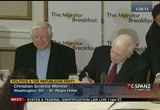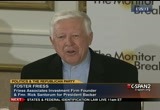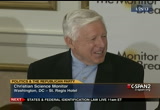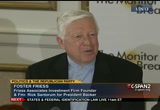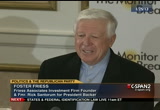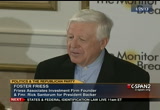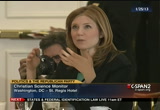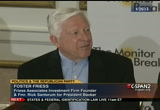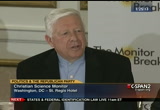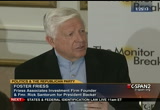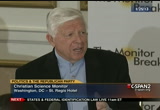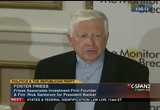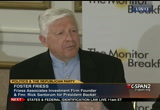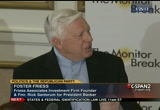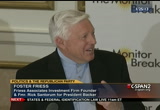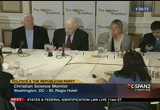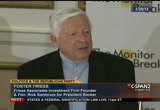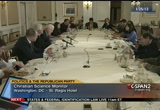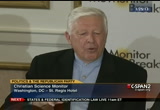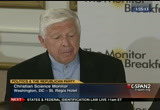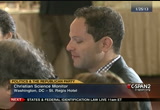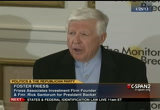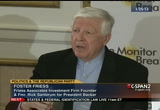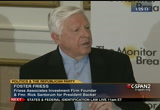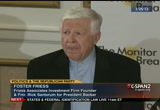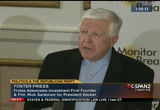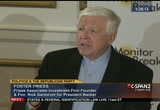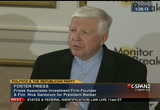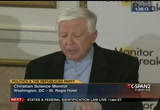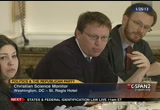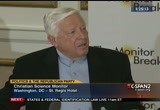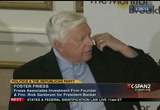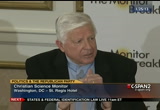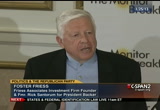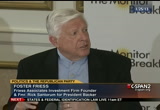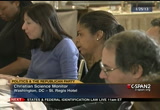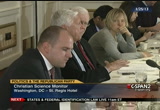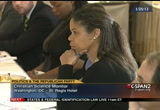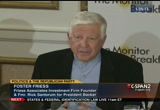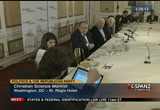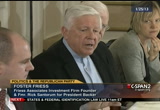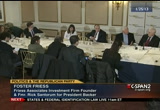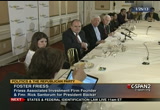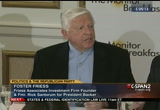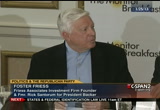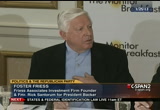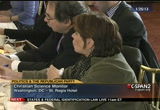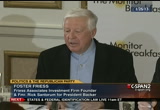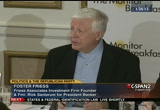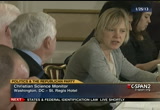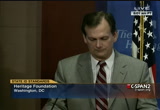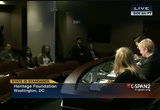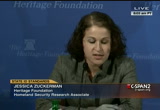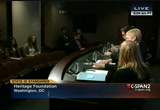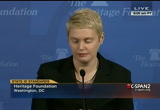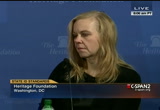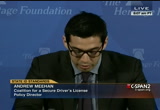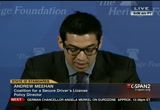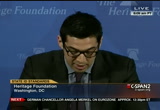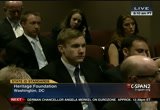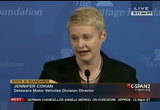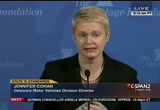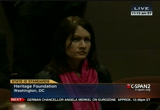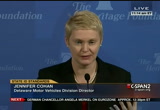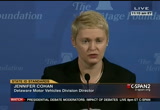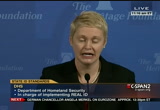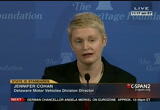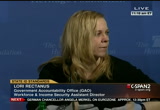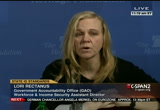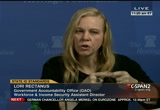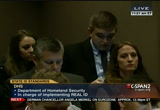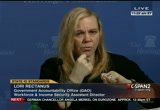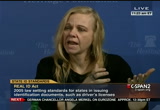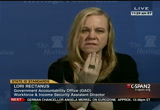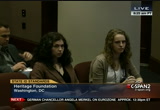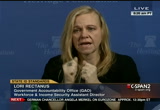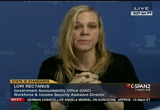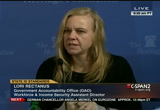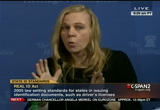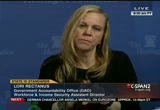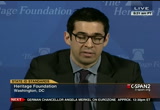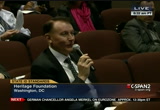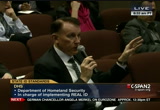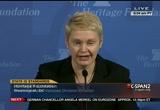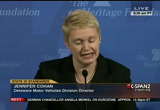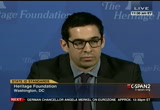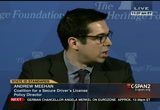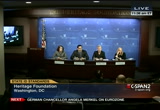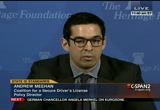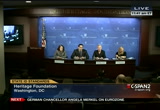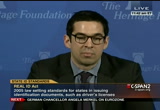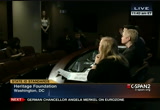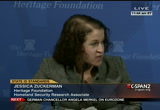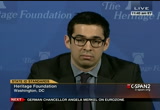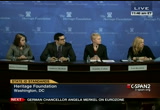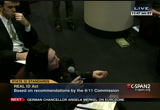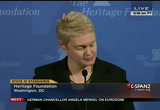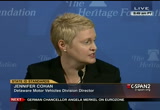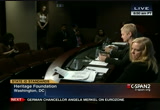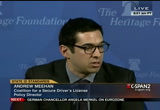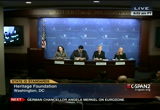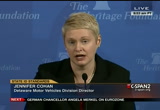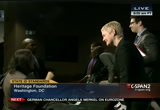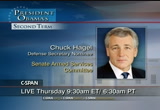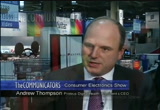tv U.S. Senate CSPAN January 28, 2013 8:30am-12:00pm EST
8:30 am
discovery, and we take it through the fda process, and then we'll launch it into a clinic, a hospital as a regulated product. >> host: how long can that take? >> guest: well, you know, the regulatory agencies have really gotten a lot better about this because, as you know, cancer -- people don't live that long if we don't give them these great discoveries. but the agency's been very, very open about we understand that we don't have a lot of time here. but you're looking at a year to two years. a year for us to develop the clinical trial data that we need to submit and then another year for the fda to review it and get it released. so it's not an obnoxious amount of time compared to a potentially they therapeutic approval, but we do need regulations that allow us to take research discovery faster into the clinic for stage 3-stage 4 cancer. stage 1, stage 2 we can get those treated and monitor them, stage 3 and 4 it's almost a hail mary, and we're trying to do something for that patient, and
8:31 am
that's when we need to pull these discoveries out of research and more rapidly move them into the clinic. >> host: is it expensive, the regulatory process? >> guest: it is expensive. it's expensive because the fda and agencies like that around the world, their job is for patient safety. so a lot of what we have to do is run a number of samples to insure the efficacy of the test, the efficacy of the drug with the test and then the patient safety. so you're looking at anywhere between $3-$5 million for a clinical trial and then the actual data submission and in all you can add it up to about $10 million to submit a panel for approval. >> host: ron andrews, as somebody who's in the medical technology field how do we, how do you stop the pressure on medical costs? how do you stop that process of continual new technology that has new costs, etc. >> guest: yeah.
8:32 am
this is the dilemma we have in our industry because we all want to live longer. in fact, we're all looking for the fountain of youth, right? and arguably, some of these discoveries will allow us to live much, much longerrer. longer. but the cost of that to the health care and the cost to the government can become prohibitive at times. so at life technologies what we've done is we try to focus our investments on technology that while the technology itself may be expensive, if you look holistically at the total cost of that patient event, it's significantly reducing the overall cost. let me tell you what i mean by that. if you have an $80,000 cancer drug regiment that only works in 25 percent of the patients, if we run a thousand dollar test and pick the 80% that don't receive benefit from that drug, not only do we spare the patient the side effects, we save health care a tremendous amount of cost. the administration, the obama administration a few years ago when we were in the throes of trying to figure out what we were going to do about health
8:33 am
care, they used to quote some data, that $70 billion in 2008 was spent on oncology drugs and somewhere between 20 and 25 billion had no impact on the patient. so if we were to spend three billion in these amazing test capabilities to pick the 25 billion that wasn't going to respond, you save the overall health care costs. so we really are looking at these game-changing technologies to improve the overall cost of care. the beauty of these is it really is the's tense of personalized -- the essence of personalized medicine. if we can more effectively take your dna and we can identify the nuances of your specific disease and get the right treatment to you sooner, we don't practice trial and r record medicine that's typically practiced in our community today, and you can read every analyst that analyzes the health care community will give you numbers all over the board. but it's hundreds of billions of dollars wasted on trial and error medicine. and more specific approaches to treating disease at the individual level really will
8:34 am
save us a tremendous amount of money. >> host: ron andrews of med sal sciences for life technologies, do you work with the nih? do you take grants from them, and how do you, how do they view technology in medicine? >> guest: well, we're one of the largest supporters of the nih, clearly, and they use our technology. you know, it's used all over the nih system. francis collins, who is now the head of the nih, is very fond of my chip. i've seen him in front of congress, and he's up there talking about how health care's going to get changed. so we have a great relationship with the nih, and they grant money out to academic centers and to researchers and, of course, we supply those researchers with technology so that they can do this advanced research on diseases. >> host: ron andrews is the president of medical sciences for life technologies. we're here at ces international in las vegas. thank you for your time. >> guest: thank you, peter. of.
8:35 am
>> host: our programming from the ces international show 2013 in las vegas continues next week. this is "the communicators" on c-span. >> coming up, a group of journalists discuss the future of conservativism and the republican party at a conference of the national review institute. after that more on politics and the republican party with remarks by investment manager and former rick santorum presidential campaign supporter foster frieze. and later, live coverage of a forum examining a law passed in 2005 that sets minimum standards for driver's licenses and state-issued id documents. >> now, a group of journalists discuss the 2012 elections and the future of the republican party. they comment on why mitt romney lost the presidential election and the strategies republicans should utilize to appeal to a wider range of voters. among the participants are weekly standard editor bill kristol and msnbc host and
8:36 am
former congressman joe scarborough. this forum was part of a conference hosted by the national review institute that examined the future of conservativism. it runs about 90 minutes. [inaudible conversations] >> hi, everyone. wow, wow. incredibly loud, louder than i thought. apologize. i apologize to your eardrums. i'm with national review, and this is our panel on what's wrong with the right. it's going to take the next 72 hours, so i hope you all have provisions for the next couple of days. i'm here with john pod hotter and bill kristol, founder and editor of "the weekly standard," and we're going to get right into it. john podhoretz -- >> podhoretz --
8:37 am
>> john podhoretz, you wrote a book a few years back called "bush country" in which you celebrated the achievements of our 43rd president, and george w. bush was a guy who thought deeply about imuation reform, poverty and trying to craft a middle class agenda for the gop. george w. bush is a figure that many republicans have been running away from. so tell me, do you think republicans were too quick to abandon george w. bush? >> i'm sorry, what? i was tweeting. i'm sorry. [laughter] um, well, yes and no. i think, obviously, politically republicans distanced themselves from george w. bush because it was politic thing to do. numbers don't lie. he became very unpopular. parties tend not to embrace figures and politicians who become unpopular.
8:38 am
my view is that a lot of the distress over bush's domestic agenda from which republicans fled beginning really in 2005 had, it was a, it was an ancillary result of the failure to secure victory in iraq early and to have a favorable reckoning -- >> so iraq sank what might have been a successful domestic policy agenda? >> right. well, what i mean is that i think the entire country stopped listening to president bush on what would be efficacious for the country when it lost faith that he was managing the war effectively. and so he found it more difficult to get hearings on some of the issues that now are bedeviling the republican part. i think a lot of people on the right themselves took aim at
8:39 am
bush on a lot of these domestic issues because they were feeling extremely distressed about what was going on in the war and did not want to turn on the war. we have supported it, we have troops in the field. it seemed like a noble endeavor. but they were angry at him, and they were angry at him for throwing them on the defensive for seeming feckless in the management of and prosecution of the war. and i think that these were, you know, this was sort of, you know, concomitant casualties and that as a result the republican party getting thrown on its heels on immigration, you know, in many 2006 i published -- in 2006 i published a book on hillary clinton called -- >> john, we're going to come back. >> no, let me finish this point, because it's interesting. the morning i did, i had 150 radio interviews scheduled, the book was being sent off in a big
8:40 am
way. first book about hillary clinton in 2008, and i did eight interviews the first day, and every single one of those interviews i came on on a conservative radio station somewhere in the country, and i said, yes, i'm here to talk about my book, "can she be stopped," and the conservative radio talk show host would say -- this is april 2006 -- i don't want to talk about that, i want to talk about immigration and what bush is doing. what's going on? this was supposed to be a friendly audience who hated hillary and would love to hear how she should be stopped in 2008, and no conservative in the country wanted to talk about the democrats. they wanted to talk about bush and distance themselves from him on immigration, and i think that was a very telling indicator of everything that has come since in relation to how it is that people can hear about immigration, social security reform and poverty. >> yuval, you are the person i turn to when i'm looking for optimism about the republican
8:41 am
future pretty reliably. when i think what on earth are these guys doing, suddenly yuval makes sense of it in this a way that i always appreciate. but i wanted to ask you, so one of the republican governors that a lot of us are looking to as a bright light is governor bobby jindal. and recently he gave a terrific speech in outline about how the gop should be the party of growth rather than the party of austerity. but then when it came to substance, what are the kind of policies that should be backed by the party of growth, he turned to term limits and the balanced budget amendment. both of which are things that i think we associate a lot more with the party of austerity than the party of growth. and i wonder, does this reflect a broader intellectual exhaustion? we have a lot of younger republican politicos who are talking about new ideas and a middle class agenda, but we keep hearing these retreads. so what's your thought about that, and are we going the hear more? and should we all fall into despair? is. >> yeah. well, okay, let me make you feel better again then since that's my role.
8:42 am
i think that it's not quite right that we're only hearing retreads. i actually think the last two years for all of their difficulties and for all of their having ended in a terrible election have been a time of some real creativity on the right. first and foremost, and maybe it shouldn't have been first and foremost but it was on entitlement e reform where the republican party really has moved, i think, pretty dramatically in the right direction and is even learning about how to speak where it's moved to which has always been a problem for conservatives, i also think, though, in terms of talking about growth and prosperity which is absolutely what conservatives should be talking about -- republicans have to be the party of middle class prosperity -- even governor jindal is better than he says. it may be that when he talks about it to one audience or another, he ends his sentences by talking about the balanced budget amendment and by talking about, you know, various policies that were very creative and helpful in 1983 which a lot of us do, i have to say.
8:43 am
if you look at what governor jindal is doing in louisiana including the tax reform he's just launched in the past few weeks, what he's doing is trying to think about how at this moment at a time when globalization's putting enormous pressures on working class voters, at a time when the economy is going through a very complicated, difficult moment when it's not clear how to get back to growth, he's thinking creatively about how to use the strength of his state to build on its weaknesseses. and i think at the national level that's what conservatives have to do. to some extempt, it's being done. i would say the policy agenda that has to come at the end of that conversation is not fully worked out by any means, but the questions are being asked. i think the direction of thinking has been helpful even in the wake of the election. if you listen to what people like marco rubio or paul ryan have been saying, it's different from what they themselves were saying six months ago, a year ago. i think the focus is turning to the right place. that doesn't mean that he'll
8:44 am
persuade the public, but it certainly helps to ask the right question if you're looking for the right answer. >> where joe, i want to bring up something that my friend john podhoretz mentioned, and i say that carefully because reihan salam, my name has up been butchered by others, so i want to thank you for the privilege of butchering someone else's name. it's a rare treat for me. [laughter] i wanted to ask you, part of what i heard in john podhoretz's remarks is that some of the difficulties we encountered, shall we say, during the invasion of iraq and the occupation were things that really damaged the republican brand in a deep way, yet -- and so you've had a lot to say about foreign policy. you've also had a thing or two to say about the republican position on taxes and a number of other issues. so i wonder, is your view that republicans need to get right on foreign policy and can that that is really a core issue that's affecting everything else, or do you see that fundamentally as a garnish on the salad, something maybe we ought to -- a nice to
8:45 am
have, not an essential? >> you know, i think we need as a party to have -- i won't try to say his last name because i always butcher it myself -- i think we need john and bill need that wing of the party, but we also need realists that acted and thought and saw the world like we with did when we were in congress in the 1990s, when we controlled congress from '94 on where we believe inside a restrained foreign policy. ..
8:46 am
as long as republicans have a coherent foreign policy, i think americans will go along with it. i think our bigger problem from the bush era came from the fact he's a big government republican. he came in with $155 billion surplus. when you left we had a trillion dollar deficit. our national debt doubled. witty 7 trillion-dollar medicare drug benefit plan that polls showed was a 50/50 proposition at best. george w. bush didn't veto a single appropriations bill. and we saw not only, because when you say this, and start going down the list, some republicans will get defensive. i like bush. i campaigned for employers. i largest tax cuts. i loved john roberts, except for one decision. i love sam alito on every decision. george w. bush did some great things but i will tell you why.
8:47 am
he completely muddied the brand when it came to what is our core issue and what has always been our core issue. that we are a party of small government. and if you give the american people the choice between -- [applause] voting for a big government republican or a big government democrat, they will vote for the big government democrat every single time. so what george w. bush did over eight years is destroyed our brand. as buckley said again of bush, you know, he's a conservative guy, but george w. bush is no conservative. >> joe, you really know how to work the crowd. i'm and pressed. >> they believe we should be the party of small government. >> i'm so glad joe's remarks came right before ross douthat's remarks. because i believe ross douthat hadn't article edited by bill kristol. the main problem with bush
8:48 am
wasn't -- i want to talk about a broader thing. joke isn't the only conservative out there believe republicans should be the party of small government. and ross, you've advance a different take there ought to be a new synthesis between social conservatives and and economic conservatism. and first i want you to talk about that but also want you to talk about the fact and the 2012 election you yourself have said since the first election in modern american presidential history in which social conservatives might have been a liability for the gop rather than a strength. that's pretty big coming from you and i want you to respond that. >> i can't believe a guy from "the new york times" would say something like that. [laughter] >> you should come from a place like me. and by the way, reverend al says hello. >> i was saying it was lovely to be funded being on a panel with
8:49 am
is a conservative sitting next to me. whose views are more liberal than my own. that's why i am here. let me start not by sticking up for big government conservatism but by sticking up for george w. bush's attempt to solve a problem that the republican party still has and will has more so today. which is basically that it doesn't know how to talk about the issues that the american public, particularly let's say middle-class swing voters are interested in talking about. if you go back and look at the reagan majority and the reagan coalition, the victories of 1980 and 1984, 1988 and so on, those victories were built on an ideological argument about small government, the limits of state actions and so when. that was a big part of the reagan system. but it was also about policies addressed to specific problems in american life in the late
8:50 am
'70s and early '80s. so if you were not that ideological, made conservatively american in 1977 or 1981, 1983, what were you concerned about? obviously you were concerned about inflation and economic stagnation. you are concerned about the fact that rises were going up. your paycheck wasn't growing and they were making your taxes rise. dividends and the fact we were living through a generational -- unprecedented period of urban disorder that nobody but certainly no democratic politician seemed to have a solution to. you were concerned about something, the soviet union which -- >> what are -- >> now what are people concerned about, people are concerned about health care costs and education costs. and to a lesser extent, when economic growth is stronger as it was later in the bush years maybe they're concerned about issues related to the bottom and so.
8:51 am
education and health care and sort of the broader challenge of globalization, those things loom incredibly large and the republican imagination and those are not issues republicans like to talk about. this is where compassion conservatism didn't emerge any backing to emerge in the late 1990s from a period when bill clinton had been something republicans up and down washington for four, six years. and the whole point of bush's him was to craft a republican party that had something to say about education. that's something to say about health care. you can go back and said, i think justifiably, that something like the prescription drugs bill was too big, cost too much, should've bee been paid fn someone been paid for and so wanted you to make similar critiques with no child left behind by the republican party will never get back to the wilderness if it just says we have to keep our brand fewer and make sure americans now we are the party of small government. americans are pretty confident right now i would say in the post-paul wright added that the
8:52 am
republican party is the party of small government. they didn't vote for the republican party in the last election cycle, even with paul ryan on the ticket. and yet it's possible if you don't nominate a mitt romney next time, get a truer concerted and so on, and things we different. ultimately, if you look at the holes in election cycle, rock obama won because people thought he cared about people like us. that's a touchy-feely kind of sense but. it's the kind of sentiment that republican politicians have to deal with and that george w. bush for all his many flaws was better at giving with than any leader of the policy has been since. >> and also though, it's not just grand purity because grand purity -- we've got to be able to explain to middle-class americans, the working-class americans, the people of seen their wages fall over the past five years how we are different from the democratic party. the democratic party will say we'll give you a federal government program, and we're going to give you more cash and
8:53 am
we'll give you more money. and we will tax the rich there. that's how you're going to get back to work. that's how we're going to get your child into the college they want to get into. we have to make, our core message. we've got to make our core message relevant again to middle-class americans. the reason why romney lost and you can look at romney, i'm sort of if we have a lot of mitt romney than steel industry, it took about three minutes of listening to mitt romney talk about economics, that he didn't get it. he didn't get -- >> i want to come back -- is one that on this down who spent much of 2011 and 2012 maneuvering desperately to try to get absolutely anybody to jump into the republican presidential nomination fight. the list is endless. john podhoretz is on the list at one point. but jafa doors 2012, built live up to new hampshire and was
8:54 am
treating him. it was amazing. bill, i want to ask you, you try to get an endless parade of republicans run for president in 2012 and a want to ask you, do you think what we need is a leader? is a leader enough? given we have identified a ton of pretty deep structural problems, and we will get more about the republican party and how it speaks with coalition, do you think a leader is basically what we need to snap back into fighting form? >> first of all, let me just say it's great to be here on this fair and balanced panel. [laughter] i was moderate of this panel at the federal society of conference several years ago. it was an honor i got to moderate a panel. i said this is my idea of a perfect space. my spectrum of the penny. this does have a spectrum. fox news, msnbc, the new your times, "national review," people on the panel whose names are easy to pronounce and people's
8:55 am
names who you can't pronounce. i also do want to say it's great to be at another "national review" news conference. i was here in the mayflower a couple miles away. right about this time, i think was january 1993. there was a sense of despair. we had 12 years in power and then breaking ambush. i was part of the white house. republicans were 170 seats in the house may be. just 42 senators. and i remember how important that conference was, a., to cheer people up, and give people a sense there was a future, but also to have vigorous debates about what the future would be the one thing the "national review" has done over the years, planted the flag and been a beacon for conservatives but also has featured many debates of this nature about what the empathy should be.
8:56 am
there is millions, different kinds of foreign policy. if restraints of economic policies. monetarism. even on social issues. not uniformity there at all. i think that's healthy for the conservative movement. i really do believe people should not shy away from serious taxable debates, strategic debates and even debates about principle. and so reihan, yeah, inc. -- a leader would be good. would you like have a strong leader or not? i think strong leaders are good. [laughter] spin within the limits. >> come on back on the phil. >> i would say -- >> the question is is a leader all we need? >> it is not all we need obviously. are serious issues, some of the people on the panel discuss over the weeks, months, years, i think about the republican economic agenda whether it's such a successfully justice take about of events of 2008.
8:57 am
there are several conservative explanations what happened in 2008. not all consistent with one another but there's republican explanation of how they can make a financial disaster in the last financial meltdown, in 70 years under republican presidents after 12 years most of republican congress. we can say it wasn't did what he did, that's fun. one big problem bromley had to solve a thing was there was just no kind of clear reasonable straightforward explanation of what most americans thought, maybe didn't like president obama much. barack obama wasn't president and they were a little better off by 2012 which seems to be -- but still we seem to be the often had been under bush. that's what i think of the most damage. the war we can debate for ever and other mistakes. of the problems that people like
8:58 am
trent has been -- ross douthat talked about earlier. i don't know that republicans, i'm sure republicans don't have a very clear and good explanation. and i'm not worried even conservatives have accepted certain explanations about the community investment act or whatever. and i think there are a lot of good instincts about not to go down that road again and what has to be done. one last example. dodd-frank, very bad legislature. the centerpiece of the obama at the democratic agenda, really -- everyone was against it. we published articles against it. republicans won the house. november 2010 to the republican house passed the legislation to introduce legislation to repeal the dodd-frank or to replace dodd-frank with a sensible kind of financial regulatory
8:59 am
structure. so what does that say about where republicans were in their positive governing agenda question you have some regulatory structure. that's some and as to what you would replace dodd-frank with? mitt romney also didn't commit for a replacement for obamacare in the health care. a lot of conservatives blame the republicans. if you're a member other public and party and people are saying obama is terrible, what your replacement for obamacare and dodd-frank? we don't want to get into that right now. that's not serious governing party. in that respect having a leader won't be enough to having serious policies of the national level comparable to those a lot of governors are in pursuit of the state level. >> i think there's a movement issue. i were to do. the conservative movement came into fruition with reagan in 1980. it's now, as a governing force, it's now three decades old. a lot of what goes on in
9:00 am
movements, as result of three decades and a lot of groups getting involved and a lot of interest groups on the right is a kind of choking off of a lot of conversation because if you start down the road the bill is going to you start talking about what is the kind of regulation you should have. and instantly you trigger a regulation, bad, regulation is bad so, therefore, talking about regulation, particularly among the republican audience, particularly in a republican presidential debate becomes the know know. someone can turn the unsavory or, you're just a big government, always wanting to regulate towards small businesses. and there is a problem with as i say, for three decades of movement thinking that ends up creating advanced, -- creating dead ends when the road needs to
9:01 am
be laid down for the future. and if we don't, if we think for 2015-2016 when there is another serious national debate among republicans, if it is the case that you cannot have a serious conversation about what replaces health care, what replaces dodd-frank, how the levers of government are to be used by republicans rather than saying the levers of government themselves erupted in evil, then you're not going to be able to talk to that, you know, then you really aren't in a position where not going to be able to talk to people who do not come to you at the beginning with the same ideological framework that you do. >> john, i have a question for you and fortune. it is pivoting off some what bill said a moment ago. one issue is when you're talking of being a party of small government, the question is to become a party that is all fix -- all stick and no carrot?
9:02 am
what you're looking at the republican post 2010, it should look like this is a party that at least seems series about -- so the problem is when looking at the reagan issue, look at the supply side, they soon be offering a non-zero-sum vision of the future, a vision which we're all growing together. a vision that is not exclusive but that is inclusive. the problem is given the scale of deficits were facing you have talked about why republicans shouldn't fight every tax increase to the nail. so if that's the case how do you avoid the party that is all stick and no carrot? that's not often something to people who are aspirational speak with you can't do that. ronald reagan and david stockman's book was quoted as saying during two people are coming in saying we need another wave of cuts. we need another wave of cuts. and by this time 83-84, reagan had realized that the country had had enough for a while.
9:03 am
and he said i'm the guy that always wears the white hats. you can always wear the white hats, but you want to elect a leader that has a presumption, a basic presumption that people on the local level can do better than people on the state level. but when they can't let people on thon the state level handle . been have the presumption that people on the state level can handle it better than the federal government. but if the state level can't handle it, then okay, we'll get to the federal government and let them handle it. >> but if the state levels are you guys are cops and firefighters and teachers, where is the carrot? >> right. again, you've got to be pragmatic about it. i keep going back to berkeley, but buckley is a great example of a guy who understood you have conservative core. but at times you got to compromise because as buckley always said, conservatism requires ability to realism. he had to go out to california, 1967 and defend ronald reagan,
9:04 am
conservatives were enraged because reagan wouldn't keep the government shut down. time and time again that reagan had to make substitutions through the 1980s that his conservative base didn't like the pat buchanan told me they didn't do what the heck they said about him in the near times, but when he read human events and their saying he was insufficiently conservative, they would go into a rage. that's got to be a balance. there's got to be a balance. but i think most importantly, i mean your focus has to be on winning. and our focus has not been on weaning -- when he. there's a reason we have lost five out of lost six presidential elections. the reason what is with choke off debate like john is talking about. whether you're talking about regulation, whether you're talking about taxes. i've been a tax increase absolutists. i've been against it. i've always said raising taxes is immoral, when you add federal and local and state and people
9:05 am
are suddenly getting more than 50% of the wages to the government at all levels, that's immoral. that said, when i read bill's article, i think it's a courageous article, i know bill, you are hearing that can be from a guy at msnbc that had to make your heart swell. [laughter] bill said -- he asked an important question. and the most important part of the question is erase the question. and that is why the second, why should we keep putting our political necks on the line? its rich guys. they make billions. >> so just to press this point a bit. john, so if the republican party is a longer the party that is promising middle-class tax cuts, there's not that much room to give up more on the tax side, created. what is the republican party actually offering to voters other than discipline on the
9:06 am
spending side and we're going to shrink government and we're going to shrek government. made in an abstract way that's a good thing but what are you giving to me for the near term given as bill kristol explained, the economy absolutely blew up in 2008 and it still hasn't come back. >> to be fair i don't think, i think this is a real distinction between the right and left, even describing middle-class tax cuts the republican party as i understand it or the conservative movement believes in actions that are broad-based. you're going to cut taxes, you cut taxes nation. cut rates, you don't target. targeting and particularly at the state and local level, targeting is where giveaways take place. targeting is where, it's where you play with, you figure out ways to appeal to people. so what that means is if you're
9:07 am
in a time when broad-based tax cuts is no longer a realistic strategy, then the only way to get past where we are now is through economic growth, right? economic growth is the only solutions, cross sector economic growth is the only solution to we fell in government coffers so that the money that would have to come direct from the taxpayer and reducing the debt and reducing the deficit. >> and under those conditions, here's where it gets interesting your it has been tax cuts. that is the policy, what is the republican solution is, as i think you're the first person to lay out succinctly as anybody, is a series of governmental reforms that are brushed, that
9:08 am
make policies more coherent, that allow both on the tax side and the health care reform side of health care cost side, that your any position with the economy blogs in the economy will move that allows for growth. the interesting problem that republicans face is the kind of properly, let's say him if there's some grand bargain with obama were some good things happen, hard to imagine what could happen, you know, he may benefit. this could happen. there could be a big economic recovery the next three or four years, and then have the interesting aspect of that's good for america, good for everybody, it would even indicate if it goes the way we want to come it would vindicate a lot of our ideas. it would solidify the sense that obama had a wildly successful presidency and recent african politics ideologically. >> someone who has made a strong case for targeting in a sense.
9:09 am
you have been writing for years now that while the democrats have their various constituencies, that republicans and conservatives should think hard about the idea that is apparent. certainly middle income parents were making investment in the next generation should be thought of as a group that has a distinct political identity and political voice, and that we should perhaps target more policy, including our tax policy toward the interests of a parent. >> let me say first, targeting especially in the sense that it is vital to explain to those voters why conservative policy is good for them. the idea is not that we should think about what we advocate on the policy front but think about who we ought to get to vote for us and who we should. break it up into demographics and prevent interracial. that's not how the republican party can ever work. that's kind of transactional policy is not only impossible for conservatives, it would be very unwise.
9:10 am
but let me start by saying i think the danger of choking off debate is to my mind is overstated. i think the fear of that danger is what causes a lot of leaders of the conservative movement of the republican party to stay away from new ideas. but when you actually try, it turns out there's a vacuum editors of people are rather hungry for new ideas. and if you actually try to make an argument for why our belief and growth and prosperity, and prosperity through growth requires a way of thinking about today's problems in a new way, there is an openness to. i think we've seen it on the entire that front in the last two years. if two years ago you would have said that every republican member of congress would vote for a premium support form of medicare and republicans would run for president on it you would've been fought in saint. it would've been in seeing to it happens very quickly because an argument represented in terms that clearly appeal to conservative way of thinking about what a con is going, there
9:11 am
was a vacuum, a huge vacuum, and it was filled by the right kind of ideas. i think there's a lot of room for that at a lot of different areas. added you think as was said here by several people that it has to begin by thinking about what economic growth looks like now. republicans are got to be the party of growth and prosperity, and the facts and is i think that the barrier to growth today is not high marginal tax rate to the barrier to growth today is the profound inefficiency of our economy. and that is to a great degree of function government policy. it's an inefficiency of the public sector, and of those private sector, of those element and the private sector the much taunted by the government, health care and education specifically. it could be fixed by this is a just to the way to think about how the government ought to go about providing the source of benefits it provides, providing the kind of services it provides, approaching the economy in general. that strikes me as the obvious
9:12 am
way forward in terms of this and it carries with it a huge growth dividend the '80s and went off and the public, would offer the public a lower cost of living. where offering rising wages that are not crushed by health care. we are often more affordable middle-class lifestyle. that's done by thinking about growth but it's not done by targeting innocents of looking for where we can give goodies spent i want to give ross a chance to get into. but for someone to ask bill a quick question. implicit in the conversation so far is, i mean that respectfully, there is, there's this implicit question here from a lot of people including some of the more fierce critics of the gop who still identify conservatives that are pretty sharp about this idea that we need a real fight within the republican party. you had a decades long fight between moderates and conservatives that conservatives eventually won pretty comprehensively. and now there's this real
9:13 am
question about whether or not what the republican party needs before can have a real revival is a knockdown drag out fight over some basic principles. but and i wonder where do you stand on that? you think we need that kind of conflict? >> no, i don't. i think we need to have an honest debate but i think there's a lot of activities, new ideas, how you can have a growth agenda. because we're in a different circumstance now than we were in 78, 79. it may not be as high on the list of things that has to be a publish as opposed to massive reform of government policy. two parts of the economy that are loaded and which slows down the economy an awful lot. i feel like i should stop now. like he said i've been around the block so many times. i can barely talk.
9:14 am
you might be surprised i haven't fallen asleep you get. it is a very long table. i do want to say one word which i think in a way, i enjoy, i've been on a million panels, what's wrong with the right are what's right with wrong, all that. in some ways you just got, one doesn't know what's going to happen. this discussion can sometimes become a little bit to medicare -- meta. i do think in some ways, a little too tactical, bluetooth strategic. bill buckley in 1955 when he started "national review" famously wrote an initial issue that the point of "national review," and i think my invitation was to stand before history, yelling stop at a time when no one is inclined to do so or have the patience with those who so urge it. and i think that is also a little place for that honestly among conservatives and republicans. i was, i could argue on taxes is
9:15 am
the not right fight to fight. but there are times one just has to say look, this is wrong and this is foolish and we don't know if the odds are 60-40 we went over 80/20. we've got to fight the fight. ronald reagan fought a lot of fights in his career, including the panel in which he took on conservative elites as well as liberal elites, and ended up losing. without the fight he doesn't become the leader of the conservative movement o of the 1980s. the 1980s 50,000, the likely nominee. jack kemp doesn't yield to reckon that persuades reagan and american history is different. so i'm for fighting fights. as a row this in the context of women in ground combat units where i was very distressed that a bunch of republican senators in the last 48 hours who decided we had women in charge in 2012, so we're not going to oppose something that is literally not
9:16 am
i think an extremely damaging -- [applause] >> and will be extremely damaging to all kinds of ways and there are many good arguments against it. we wrote a good editorial against it. but a politician sometimes over thinks these things and they tell us i can't fight this fight because he we did bad in 2012 but i can't fight this fight because with other constituencies who don't want it. you end up tying yourself in knots. i think is a big possibility for political entrepreneurship over the next years. jack kemp when he took on the entire republican in 75, six, seven was a popular. you get it from the house. he was a backbencher. he was not on the house ways and means committee. they deeply resented him telling them what republican tax policy should be. so i think we have to have serious discussions of the
9:17 am
merits of these issues, obviously. but i also think little bit more thrilling occasion throwing caution to the wind a little bit more a just thing on this issue we are just getting in making the case and we'll see how it turns out three, six or nine months from now to i think -- >> whenever i think -- whenever i think of that i think of ross douthat. ross, please throw caution to the wind. >> tubules point, i have something to say but i think one of the interesting lessons of the paul ryan phenomenon, right, is actually if you are, a republican politician in washington or the country as a whole, there is a real percentage in being associated with serious substantive policy ideas that other politicians are not talking about. i think one of the biggest problems the party has, i disagree with you little on the sort of standing before history
9:18 am
thing because i think sort of all the republicans did for two years of obama. i mean this goes to sort of the question of, you contain multitudes of course you're circling budget point -- [inaudible] >> but your point about not having an alternative to dodd-frank, not have an alternative. republicans were very good thint think we're going to make obamacare obama's waterloo. we're going to stop these in their tracks but then when republicans didn't stop those things in their tracks they didn't have anything else to say. but one person i did have something else to say was paul ryan, and he was rewarded with it. poodles of media attention, massive popularity among the republican hard. the vice presidential slot on the national ticket. and so what i look at other republican politicians, other rising stars in congress and around the country, and they see them sort of talking about the idea of new ideas without
9:19 am
talking about the ideas themselves. i say isn't the lesson of rhinebeck if you talk about the specific ideas there's more to beginning and to be lost? this is i think my personal biggest disappointment with the republican party the last few years is what are the policy entrepreneurs in the party itself? i think conservatism had a series of sort of policy problem, a serious intellectual problem for five years ago. it was the end of the bush presidency. everyone was exhausted. people have tried things that work, that hadn't worked. that with a lot of fresh policy. but five years on if you pick up "the weekly standard," if you pick up "national review," you tried to -- which i plug every chance i get, you can find not just sort of -- [inaudible] >> down the line. spent i didn't want to risk your
9:20 am
last name, john. it's such a broad issue. but i don't think we just have the building blocks of the conservative domestic policy agenda. i think there is a conservative domestic policy agenda but the aren't any politicians who are interested in talking about it. >> it's not just that but it's also the question of when you have to pick your fight, if one talks about picking a fight. charles talked about at last i. there is also the fact that one of the distressing things we saw in 2012 was a kind of approach that the democrats to with republicans that even if it was not conscious, everybody fell for. the biggest one being sandra fluke. think about this. woman goes -- still not clear. anyway, claims she didn't get to testify. you have a fight. anyway, nobody knew who she was.
9:21 am
she was at georgetown university law student with an agenda about free contraception. suddenly this person out of nowhere who supposedly was denied the right to speak before a congressional hearing because the most famous person in america because republicans saw a bright shiny object. oh, the liberal feminists are attacking us for having done this, and who is this person anyway and what's going on? to the point that she ended up speaking at the democratic national convention, and that entire preposterous incident becoming an emblematic moment in this war on women fight that i'm afraid you have to say, if that were existed, democrats won in 2012. >> i out of did want to go to you, joe, pivoting off of it. the a lot of folks on this panel
9:22 am
who are social conservatives. i think you are one who believes that maybe the republican party needs a message that's a little bit more in tune, to a country that seems in a that seems in a total that seems in the total electorate changed its views on a lot of these core issues relating to what we might call traditionalism, conservatism. so want to hear your thoughts about that. is this something where republicans need to -- >> we just need to be smart. i had a 100% rating with right to life. but when i was on the campaign trail i did not says over. i was a social conservative in all areas. but when the primaries are focused on the media discussion of contraception, an issue that was settled in 1965 by the supreme court, when we focus on abortion primarily, taking care of in 1973 by the supreme court, no guns here the outline is laid
9:23 am
out very clearly by scalia in 2008 i think sometimes we get in our way what our message should be. i do want to say though, and i think really two things, i've heard two things today that i think are really exciting and really important for all of us to focus on. one is what john said. i think the debate has been stifled. it has been stifled because we have created this conservative, this conservative group thing over 30 years that's become more and more narrow. a conservative group thing that would allow all of our primary presidential candidates being asked would you take a 10 to one deal on spending cuts to taxes and everybody is afraid to talk, everybody is afraid to talk about regulation. >> joe, isn't this about quoting buckley and ranking member opportunity?
9:24 am
[talking over each other] >> let me finish. the problem is, liberals believe that you manage the government from top down. we believe you manage the economy from the bottom up. well, we're managing our ideas from the top down. you want to talk about why everybody is talking about sandra fluke? is because there are 20 or 30 conservatives proposals out there that like they were in 93 and 94. you talk about 1993. i can tell you i decided as a 29 euros i was going to by the congress in 1994, and in 93 i went around to things like this and there was so much excitement out there. there was excitement out there because there wasn't just one talk radio guy that everybody listen to, or one news channel that everybody listen to, or one website that everybody went to. you would give a great welfare reform idea from john engler in michigan. he would get great crime control
9:25 am
ideas from tommy thompson in wisconsin. and newt gingrich, along with trent lott, along with connie mack, along with jack kemp, they were churning ideas out every single day. so in 93 and 94, when i ran, i just plugged my campaign into all the things that gingrich, i think a pretty severe critic but i'll tie you what, it was him doing the very things that ross is complaining about that this republican party and our house doesn't do right now that gave us the majority. i remember in 93 going into the rnc and they had a sign that said think majority. they just laughed but i was like are you kidding me? we have no chance. we have been in the majority in my lifetime. but guess what? we got it because we had ideas. we had ideas on the house level. we had ideas in the state
9:26 am
legislatures. we had ideas coming from governors, and democrats didn't stand a chance. i was the first republican elected in my district since 1873. and they hung the last one they sent to washington. [laughter] so it's the wrong damn district. but i won because every single day i would go up and asked is not a question about education. and they would come back and say -- they talk about the crime bill and i say do know what they're doing in wisconsin right now? these are not conservative states. i talk about term limits. i talked about what newt gingrich was talk about. i'm telling you, it was unbelievable. and i was on a wall street editorial page. were you writing editorial in 94? okay, so i was trying to help. and i listened to rush when i was driving from event to event. i'm telling you i would get out there. i had so much. but it wasn't just talk. it was legislation.
9:27 am
you ask me a question about the budget, i would quote john kasich, and i keep quoting john casey. ask me about taxes, i would quote jack kemp. we don't have that today. and we don't have that today in part because again there is such a stifling, stifling i say group thing that if you go a little bit out of the way on regulation, you go a little bit out of the way on taxes, or you go a little bit speeded you all disagree with joe. as an avid reader of -- spent it's important you get hammered. >> so what you're saying is you get hammered, but you're also saying look, when you're reading national affairs, you have a rich vein, a ton of ideas. so what's the problem? >> i think in part what you're describing is top down, not bottom up. that is, it wasn't the leadership in washington for the most part they gathered of the source of ideas from the states
9:28 am
and from people in washington, from people around the country and made available to people like you in congress. spent by the idea is bottom up. they came from the states. they came from the legislative flatbreads spent they came from states, they came from congress, they came from think tanks not far from every they came from the same place where they're coming from right now. if you look at what bobby jindal is doing now on taxes, health care, if you look at what's going on with republican employees in wisconsin, a new jersey company in ohio. there's a lot of ideas and there are ideas that are just ideas that are being proposed by people at think tanks. >> how does that translate to guys and women in the house? >> i think that speaks -- there is paul ryan. paul ryan is the most, the most serious and coverage of look at a difficult issue and becomes famous, respected,
9:29 am
controversial, important and a vice presidential nominee. and h2 that there were many more politicians in washington in 93 who were fluid, fluid width not only ideas but the actualizati actualization, form the legislation or policy proposals that i think is the case now. that is a problem, probably as to reach. one of which is there are a great many members of congress and senators have been here a long time who served pashtun you don't know who they are. they do ephod of constituent service. service. they don't proposed legislation did they get reelected time and again. and then you have the new breed, the more ideological, the tea partiers and others. and they come not with a governing agenda. that's the problem. that's where bill -- >> one of the things bill was trying 20 years ago, and i think that joe has referred to know.
9:30 am
politicians can't come to washington to do nothing. that is an oxymoron. they can, to clear brush or redirect policy, but there seems to be a confusion on the part of a lot of the populist excitement and 2010 and 2011 that the best thing for them to do was nothing. the first debt limit fight in the summer of 2011, i think back to a lot of let's say red states as a website. this proposal somehow that's what the united states should do is default on -- is it really exciting moment because what we should do is to nothing, default on our debt and have a big sort of crisis that could lead to fun to change. this is not a rational response to a particular political moment. just as i don't think it was earlier this year. politicians have to act. they have to work. they have to do things. >> and when they do that they
9:31 am
inspire. the reason i decided to give him 29 year-old guy never in politics, i didn't have any money. i had no name id. i decided to run for congress, quit my law firm to just take the jump. when i saw john kasich who sounds boring, but when i saw john kasich debating for three hours with tim penny, his plan to balance the budget. and i sat there and about two or three hours later i thought, you know what, if you go up there and do something but you're right. what you want to do is come up and do nothing, this is very -- >> hum going to les ross jumping but then i'm going to take a hard benefit. >> i think we're actually -- in certain ways we're being kind of optimistic because we are, i think it implications that assure but most people understand is that the are a lot of ideas out there, that if you get the right leaders with the right ideas, the republican
9:32 am
party will make a comeback. i feel that way some days but i just want to throw out another possibility which is no mike, actually there are deep structural reforms that make this kind of comeback extreme a difficult. and so you've also been talking about what bobby jindal has been doing. we been talking sort of in general stat state of reforms bi did one of big problems the republican party face in 2012 was there was a confusion about how the battle the party have been fighting at the state level mask on national political debates. you have a lot of republicans look at what scott walker has been able to do, look at what chris christie has been able to do. we are picking his fights with big powerful liberal interest groups in purple or blue states, and where winning them. and, therefore, let's do the sinking of the national level. this is one reason that a lot of republicans before the election telling me we're going to win wisconsin because we never how we did in the recall. we're just going to do the same
9:33 am
thing again. we will have the same kind of turnout. but the reality is that the problems that the federal government faces right now are very different from the problems state governments face. state government working with problems of special interest groups, of public sector union. sort of groups that are very powerful but you can isolate them politically. even in a state like new jersey. even in a state like wisconsin can say, look, average voter, these organizations and institutions are threat to the common good. they're a threat to the public interest and they're taking money out of your pocket. because that's how, it does sound so cynical and non-idealistic but also as a political debate about who is taking money out of your pockets, who's getting a better deal from his getting a worse deal. of the national level we are looking at structural problems related to entitlement. >> let's be more blunt. you are saying the problem -- >> the problem is to reform these programs there isn't a
9:34 am
carrot that conservatives can offer to sell paul ryan's in time for. paul ryan's entitlement reforms are at stake. they are a necessary stick but the artistic. to the extent that that kind of -- you can isolate medicare recipients. this is why conservatives are much more enthusiastic about talking about medicaid, for instance, than medicare. medicaid should be reformed and proposals to block grant medicaid to the state all these things, these are often positive answers proposals. but again conservatives are better at isolating this particular problem of medicaid recipients, poor people, actually all poor people, why the issues with a boomerang on republicans but they are but but they are but a sword that can isolation than you are can isolation than you are at the with the larger reality which is to reform medicare you have to take things away from everybody. >> so this goes to the larger makers and takers dialogue we been having for a long time, and
9:35 am
one thing i wanted to throw out is when you look at, so you can divide the adult population into a 30% educated, 10% that didn't finish high school, and a 60% that is summer in between. one of the really alarming a lyrical trends when you're looking at marriage and family formation patterns, 60% majority, that big middle of america, they are starting to look more like those folks in the 10% that didn't finish high school. that is a lot less marriage. so one of these deeper questions, i want to throw this to you all, when you're looking at conservatism, we have a lot of smart policy, but when you don't have a civil society can when you don't have family formation, when you don't have that robust foundation, for this kind of, families have better able to pursue economic progress on their own, then there is a really, really deep question. how do conservatives talk about
9:36 am
that? there's no policy to make young people get married and stay married. >> friendly tax reform act what are you talking about? >> did you guys write a book on that? >> let me say first, i agree with the problem but i don't quite agree with the way he lays it out because i think it actually there's more room at the national level to talk about carrots, less. the states have to deal with the national economy. a governor can't say i'm going to great economic -- he can within limits, but he can't really say because the problems we're facing are created to a very large extent by health care cost, education costs and by the global economy. at the national level it is much easier to say, and i think rightly, with the right source of say with health reform and medicare is probably interested in that context as much as in the context as we're running out of money. it is possible to reduce the cost of living in the middle class. a lot but it is possible to
9:37 am
allow wages to grow much faster than they have. there is much more to offer the public with the right kind of pro-growth economic policy of the national level than any governor could hope to possibly offer to people at the state level. >> we just don't do that. we talk about entitlement in the wrong way. >> [inaudible] >> i certainly agree that that is the essence of our longer-term social policy image. we are increasingly, when you look at how people live, we do live in two different country. i think charles murray's book last year was very powerful way of laying out how it is spent this is a very peculiar problem that we face because we all talk about this. i think we're all of him had even if you're not a hardline social conservative. you safe information. and yet we don't see, what we haven't seen, charles alluded to
9:38 am
this lastly, are the social dislocation talks of this. that is to say, when we started "the weekly standard" in 1995, the worst, very good piece, but would make you laugh if you would like to look at it was by a criminologist and sociologist was called here come the super predators. and the argument was that we had created a generation of 17-year-olds, youth, whose fathers had been in prison, never seen a strong family, none of that. and basically they were on the way to creating a crime wave the likes of which we had never seen. that is one of the great humbling moments of my life as an editor. wonderful piece, perfectly argued and it made absolute sense at the time that we published it.
9:39 am
and it was so wildly wrong that it's not 18 years later. you know, we have now lived through a 20 year decline in crime. new york city last week, not one person was killed last week in new york city. that sounds like you should celebrate something like that. >> that's a big. >> john has been out of town. >> that's right. someone mispronounce my name and i was -- but it's a real, i mean, so part of the difficulty here is when we talk about this and look at this alarming, horrible trend that is upon us, it's been upon us for 40 years. and affect a lot of most social entities that we can look out about all of this suggests that the country is stronger than it was. >> except that in terms of social mobility, rising up out of the bottom of our society, the country is much worse. and for these reasons. i think there is, there's a
9:40 am
similar kind of problem. there are a lot of conservatives who want to say if we leave this untouched, unfixed for too long it will blow up. will have a huge crush. i think it's actually much worse. if we leave it untouched, unfixed, we are going to slowly decline for a long time. we have a lot of wealth to burn they would've a lot of capital to burn in this country, and we are burning it and we're not rebuilding and that is worse than hitting a wall that it forces you to fix the problem. so we have to persuade ourselves to focus on these problems. it's a big part of the challenge of fixing it but i don't think it's too they are not real problems. >> quickly, i think john's point is absolutely right, but it's crucial to understand the lesson in the last 20 years of social and economic strength is that just as you've all said, the threat is stagnation. the threat is not crisis. you can't separate i think these
9:41 am
trends from why has growth disappointed in the american life so consistently over the last -- >> and functioning is capable of pulling the rest behind it for a pretty long time in a way that is deeply unsatisfying, not inclusive, and it's a real problem. >> that's an associate assumption. that is to say, there's a correlation question. we've had this problem of social mobility at the same time we've had the rise of globalization and the difficulty of creating work, you know, sort of like introductory work for young people here the question is whether -- [talking over each other] >> in the trendy today, if you finish school and get a job and get married and have children, you're not going to be in poverty, greed. we have a situation where fewer
9:42 am
and fewer people have that kind of life. >> i know we've got to go to questions. >> the conversation is so bleak at the right now the about our economic future, we're in pretty darn good shape if you look at the long-term. other than washington, our last gas what he's done on research, on energy, the fact that we're e a national gas supply now that is 75 years out. back in 2002 we heard it's going to be gone and decade. by 2020 going up more oil. >> and there are none. so i will keep talking. >> we have plenty of questions. from winston-salem. >> so, how do we combine conservatism and populism to get power? that's a big problem.
9:43 am
here is both might amateurs attempt to do that. i had a dream. i want a $40 trillion economy. i want 1% or 1.5% unemployment. the rights for blacks, latinos, and for women. we can have lot more things to do. we can abolish income tax for the entire middle class. we can send all our kids to private schools. we are rich enough to do it. we've got to make up our minds of what we want to do. that's how it is spent that speaks to how it is an immense amount of capital in the trendy. the question is how it's allocated on how it's used and whether it is used seems for the growth which is why -- >> i would like to bills thought. bill come to britain for your
9:44 am
tenure about populism but my sense is to have a complicated relationship to populism and how it relates to conservatism. to andres as do you think those things out to be reconciled. >> and bill, you have been around the block. [laughter] you would be best as a grizzled veteran on this panel. decades, generations to give us some of your insights, old man. [laughter] >> i bet somebody different relationships over the years, different kinds of populism. >> coolidge. van buren. >> look, it's a democratic country and i think i not only think that's the fact that electoral politics and democracy, i also think bill buckley if i can second the can was right when he said he preferred to be governed by the first 200 people in the boston phone book than the harvard faculty. the people on the whole are healthier than the elite in this country and, therefore, as a
9:45 am
9:46 am
>> we didn't answer his question which was how do you actually -- >> i don't think we're going to be able to answer the how question necessarily. i want to be sure -- >> can i ask a question though? the question that answers the question? why wasn't there one republican other than, i think, jon huntsman did it for a couple of weeks over the past year talking about the banks? why didn't anybody say break up the banks? too big to fail got bigger under barack obama. [applause] the banks -- >> right. >> the banks that acted recklessly, the bankers that acted recklessly, they got a bailout from us, they got bigger, and why didn't a republican ask the question of barack obama during the debate, hey, mr. president, what happens tomorrow if citi goes under? >> which, incidentally, employs all kinds of -- which your administration has employed -- >> right. which you -- [inaudible conversations] >> people did very well at citi in 2005, 2006, 2007. let me just say i think every
9:47 am
one of us who edits the magazine on this panel has actually published pieces that are of the break up the bank order and are critical of the crony capitalism on wall street and big businesses, especially on wall street and the obama administration. and the lack of i'm not sure exactly what accounts for it, it seems to be much of a problem at the federal level than the state level, a lack of jack kemp-like figures, paul ryan-like figures saying, hey, this is a case where i can be contrarian, i can cut against the type -- >> well, you know -- >> where i can annoy the chairman of the financial services committee in the house and develop legislation along these lines, and i think -- [inaudible conversations] >> something great on this front literally this week that i think people ought to pay attention to that i found incredibly impressive, and frankly, jaw-droppingly surprising from a member of the house gop that i think people need to pay
9:48 am
anticipation to. next question, please. >> rob from new york. i keep hearing about this pro-growth, job-creating policy. could any or all of you please describe the specific elements -- >> right. >> -- of a pro-growth, job-creating policy? >> well, step one would be to read national review and weekly standard and national affairs, and you'll get a lot in the way of ideas. whoever wants to take a first crack at that. [laughter] and can -- and the column in "the new york times." wow, sorry about that. >> i think we've all tried to address that. >> i think you have to ask what is economic growth, what actually does it consist of? basically, it consists of two things; labor market growth, more workers on the one hand, and product it growth on the other. since world war ii we've had huge growth in the labor market. the baby boomers got old enough to work, women entered the work
9:49 am
force, enormous growth. and at the same time we've had huge productivity improvements for various technological growth. we're not going to have another baby boomer generation entering the work force, women are in the work force, that's plateaued. so economic growth is going to be the result of productivity improvements. that means that we need economic policy that helps our economy be more efficient. makes better use of the resources that it has. and right now we have economic policy that does exactly the opposite of that at every level on every issue in every part of the economy. >> and specifically on the health care, we spend more money per american than any other country on the face of the earth when it comes to health care. education, we spend more money per pupil than any other country on the face of the earth. here are two great places to start. but also we've got to look at,
9:50 am
you know, third, debt. we do have to look at medicare, we do have to look at medicaid, we do have to look at social security, and we do have to plan for the next 20, 30 years. and if we take careful of those three things -- care of those three things, send a very strong message especially on the final thing, long-term debt, to the markets worldwide. you know, right now we're going through our own problems, but over the next decade or so -- and i was saying it, starting to say it before -- over the next decade or so the united states of america's going to be the best place to invest your money if we get our house in order -- >> by the way -- [inaudible conversations] >> really quickly, though, it's also i've heard time and time again over the past five years from whether it's jamie dimon or whether -- whoever it is that comes on, economists, everybody comes on and says there's $2-$3 trillion sitting on the sidelines waiting to be invested back in america, but they're not
9:51 am
going to invest it back in america because they don't know what barack obama's going to do. they don't know what congress is going to do. they don't know what washington's going to do. there's uncertainty. i'll tell you what, we can do a lot to get this economy going again just by bringing certainty back to washington, and that's a question of whether the republicans and whether barack obama can figure out how to get the hell out of the way so people can reinvest in this country. >> are also just remember one thing about this. the answer to that is in part unknowable. you just heard the gentlemen talking about hydraulic fracturing, right? hydraulic fracturing has the potential to be the most important event in american economic life since the korean war. nobody knew that it was on the radar screen ten years ago just as nobody knew what the results of the silicone chip were going to be. we don't know what innovation is going to cause. what we do know is there are
9:52 am
many policies that exist just as right now the entire debate within the obama administration over approving the access rights to the keystone pipeline is going to have quite a substantial effect on what the overall economic growth of the united states is over the next ten years. policies that seek to, um, make it more possible for those innovations to spring to life without being choked or strangled -- they wouldn't really be, but held back unnecessarily have an enormous potential for economic growth. and the point that joe's making is very important. the united states last year while this entire debt crisis was going on and our, and our level was downgraded put out a bond issue, right? so that ten-year treasury bill, and, basically, it sold out everybody who bought it bought
9:53 am
it basically at a loss. that is the interest rate is at 1.6, 1.7% which means over ten years they were actually paying the united states because of inflationary growth. they were paying the united states to park their money in a t-bill. that's the nature of the world. we sit here looking at our own navals and everything, and the truth is every place else is worse off than we are. we are poised for -- [inaudible conversations] >> i know we have another question, but in the kingdom of the blind, the one-eyed man is king, but that doesn't mean it's great to be the one-eyed man. >> no, it's terrible. [laughter] >> but who are you going to give money to to walk you across the street? >> it gives you grounds to -- >> i'm going with the guy with one eye. >> okay, next question. [laughter] >> my name is nick, i'm the president of the federalist society here at george washington university law school. speaking of fights worth having, education is state and local policy and not so much federal policy which is why it
9:54 am
frequently tends to disappear from the national conversation. how do we sustain a full court press on education e reform for school choice, for vouchers, for reforming teacher tenure? >> ross, do you want to take a crack at that? >> not really. [laughter] >> well, you know, one thing, actually, i will abuse my moderator's privilege and say a quick thing about that. i think one issue with how conservative activists talk about education policy is that they tend to talk about it as a social justice issue. you hear a lot of talk -- and this was, actually, george w. bush who kind of moved us in this direction -- you talk about the achievement gap between white and nonwhite students, or you talk a lot about vouchers for inner city students, and i think one potential problem is that, actually, when you're looking at our schools from middle class suburban students, those schools are actually pretty grim, pretty terrible. they're not doing what we actually need them to do. [applause] so i think when you're talking about this larger issue of education reform, let's not be afraid of making that issue
9:55 am
relevant to middle income voters because it affects their lives. when yuval was talking about product it and where the growth is going to come from, you know, a big wedge over the last 50, 60 years has come from improvement in labor force quality. that's a kind of creepy term for referring to the fact that, actually, your average worker was getting a little bit smarter than your average worker before, able to do a little bit more. the problem now is you have a situation where 65-year-olds leaving the work force are about as educated as the 21, 22-year-olds entering the work force right now, whereas if you look at east asia, there's a big, big gap. the workers are getting smarter and smarter with each passing year. it's one of the reasons that a lot of economists believe that our productivity growth is going to be stagnant. so i think we need to talk about this as an issue that is directly relevant to middle class voters and talk about it as a real core economic policy issue. and i think that's a big, big opportunity for conservatives as
9:56 am
well. next question. >> see? >> yes, thank you. [laughter] john from massachusetts. my question is a pragmatic one from an activist point of view. let's assume we pull together the really good ideas and we have great leadership, and we create an inspiring vision. the question is, how do you transmit that inspiring vision to the average voter? >> be well, the perp that i always alternative finish the person i always turn to for inspiring visions and john pod podhoretz, and i wonder if you have any thoughts about this. >> well, that is where leadership actually comes in. the issue about salesmanship is about who sells it. if the ideas are smart enough, and i think they are. it's weird to talk about them because it's like they're sitting over there, and you can go visit them later or, the ideas, they'll tell you what they are. but that is where politics comes in. politics is about salesmanship. politics is about conveying,
9:57 am
finding ways to connect the large macroeconomic, macro policies that the government is going to do to the lives of ordinary people. and off that happens -- often that happens thematically. i mean, the part of the republican coalition that has vanished because of the changing nature of the world and wild politics successes and the decline of crime and the lost of the soviet union was secure. in the party, if you were concerned about your security meaning your personal security, the nation's security, democratic party stopped speaking to the that, and the republican party spoke to that. that was not necessarily a message that anybody -- somebody had to come along and figure out how to make that cohere. so this is the x factor. if you don't have a salesman, you don't have the policies that can sell. this is where the 2012 election is instruct iive because you can look at could mitt romney have
9:58 am
done better? the answer is, sure, he could have. he made deliberate choices about what kind of campaign he was going to run. bill was talking about this for months, that running on the presumption that a bad economy was going to get him elected freed him of the responsibility for making positive arguments about a lot of of, about a lot of things and making those structural arguments that might have been a counterweight to the data mining magic of the obama machine. but there was no counterweight. >> but if i can follow up really quickly though, too, macro politic, i'll tell you what, we saw it in this election, and i've got to say i i was shocked by it. macro politics has got to be filtered down into micro targeting. i'm telling you, we don't have a national election anymore. we didn't have a national election for president this past year. we had an election of about eight states. the obama people were smart enough to figure that out,
9:59 am
republicans were not. and they went into those eight states, and they mined data. they did it on facebook, they did it on twitter, they did it in all these other places. they killed us, they absolutely killed us. do you know how they did it? they spent tens of millions of dollars. chris christie's top aide went to him in june and said i've been looking at obama's sec records. we're in trouble. he said, why? he just took it out and he looked through it. he spent millions and millions and millions of dollars finding people. it was the 2012 equivalent of what i did in 994. i had no money, so i got the super or republican list, and for a year i went door to door, and i knocked on republicans' doors that voted in primaries. i didn't want talk to anybody else for 18 months -- i didn't talk to anybody else for 18 months. well, my kids, my wife a little bit. but outside of that, they focused on it. 2012, again, we've got to get
10:00 am
past this idea that i had and i know a lot of you guys probably had, you know, this is going to be a lot like 1980. it's going to break the last weekend because there's 30,000 people at that pennsylvania rally. how exciting? oh, my god, we have 35,000 people in ohio, the people were crazy. mark halperin called me up and said i've never seen anything like it. the election was over. it was already over because obama's people targeted their voters, they found them online, they dragged them out, they had people calling three times in one day on cell phones. they kept at it. that's how we win. you know what? the leader matters. the message matters, but make no mistake of it, the obama people marketed their guy like he was a bag of potato chips. >> well, but -- >> and i'm not being cynical here, that's how we're going to win four years there now. now, if you have a great leader, if you have a reagan, if you have an obama in 2008, if you have a clinton in 1992, then,
10:01 am
yes. that wave will crash over the micro targeting. but in a close race, this is the future, and we got whipped. >> okay. we only have two minutes left, so i'm going to -- one question, and're all going to -- we're all going to give really quick replies. >> great. gentlemen, don't we have to talk about this in smaller terms? this is the land of liberty, but our own government is stifling it in every walk of life. i'm a physician, and lyndon johnson has destroyed american health care, the health care profession. so granularly, i had a 450-pound 45-year-old the other day told me to f myself because i kept pressing him to become healthy. he's not going to do it, because if he did, he would lose his social security disability income. the other day my i.t. employee, a bright young kid, high school graduate, just got himself $110,000 job, had his home loan pulled because he had a little
10:02 am
squabble with a crooked builder, dropped that house, gave away his thousand bucks. but he can't get his, he built a house, and he can't buy it because the bank canceled his loan. of this guy is the most reliable thing you'd ever imagine, and then we read that dodd-frank and obama are still doing that home loan scam so that if you can't afford a home, you can get a lope. but this gentleman can't. so don't we have to find these stories where our own government is killing us, killing us every day? >> yes or no question, should we find those stories? do you want to start? >> sure. that's part of the way a leader sells his policies is through the use of illustrative anecdotes that connects and resonates with people, of course. and there, i think, unfortunately and to our great
10:03 am
sorrow, by 2016 as a medical professional, um, there are going to be a great many more of these stories about what has happened, is going to happen to the medical profession as obamacare is implemented that we don't, we can't even imagine yet. >> i'm all for it. [laughter] and we do have -- we do have to tell the doctor's story, for instance. it's going to be hard. but, you know, we have to tell americans we want to save medicare, that we can't just take from providers. talk to any physician that operates, talk to any physician that works day in and day out x they will tell you this is going to opt out of medicare. >> any final wisdom? >> just that you all need stories, but you also have to have answers to the other guy's stories. and, you know, this goes back, i think, to the previous question about what do you, you know, when you're talking about policy at the local level, like if you look at the health care debate,
10:04 am
there are a lot of people in the united states of america who don't have health insurance. and can't afford health insurance. and that's not because, you know, it's not, it's not because the american health care system as a whole is terrible and so on. it's often because of the structural problems that yuval and other people write about all the time. but to those people, the republican message on health care doesn't have, it doesn't have anything to say. if you can't afford health insurance, mitt romney had nothing to say to you. and we need something to say. and that's true across a whole host of issues. so, yes, you want stories that ratify and reinforce your point, but when president obama gets up there and says and starts talking about real people who really can't afford health insurance, you have to have something to say, or else you're going to lose. >> be unfortunately, i got the throat-slitting motion from the folks on the staff here -- >> well, that's okay. bill's asleep down here. [laughter] [applause] >> thanks very much. [applause]
10:05 am
>> do you believe that? you turn 45, and they go after you. >> up next, more on the future of the republican party with remarks by investment manager and former rick santorum presidential campaign supporter foster freiss. of after that we'll be live from the heritage foundation with a look at the real id act passed in 2005 that set my mum standards for -- minimum standards for driver's licenses and state-issued identification documents. and later the senate gavels in at 2 p.m. eastern for general speeches followed at 4:30 with debate on a disaster aid spending bill for those affected by hurricane sandy. live gavel-to-gavel coverage here on c-span2. >> now, investment manager and former rick santorum supporter foster freiss reflecting on the 2012 presidential election, gay marriage and the future of the republican party. this event was hosted by the christian science monitor in washington d.c.
10:06 am
[inaudible conversations] >> okay, here we go. i'm dave cook from the monitor. thanks for coming. our guest this morning is foster freiss who is visiting our fair city from his home in jackson, wyoming. he's accompanied by one of his advisers, matthew taylor. our guest was born in rice lake, wisconsin, and earned his degree in business administration at the university of wisconsin where he met his wife, lynn. he served two years as an army intelligence officer and then founded freiss associates, an investment firm whose brandywine fund was wildly successful. he sold controlling interest in the firm in 2001 but remains as chairman of freiss associates. in recent years he's focused on philanthropy and political activism including being the largest owner to senator santorum's 2012 political campaign. all that and hunting the occasional 14-foot crocodile in
10:07 am
tanzania. thus endth -- i'm not making that up. that's the biographical portion of today's program. as always, we're on the record here. please, no live blogging or tweeting of any kind while the breakfast is underway. there's no embargo when the breakfast is over except that c-span has agreed not to use video of the session for at least who two hours after the breakfast ends. finally, if you'd like to ask a question, please do the traditional thing and send me a subtle, nonthreatening signal, and i'll happily call on one and all. now we'll begin by offering mr. freiss the opportunity to make some brief opening commentt then move to questions around the table. thanks for coming, sir. >> it's a delight to be here. on december 25th, i was a complete unknown. i had homes in jackson hole and wilmington, delaware, i had a presence, and then all the people i owed money to knew me, but that was about it. so after the santorum victory in iowa, i got the chance to meet many of you, and it's quite an
10:08 am
impressive experience, because i had a whole new respect for the media that i, frankly, didn't have before because i was treated politely and kindly and was not distorted with one or two exceptions. so my respect for the media has grown dramatically. >> i think we can change that this morning, sir. [laughter] >> what matthew and i are up to now is realizing that in the last year and a half we'd have an unusual amount of divisiveness and negativity interjected into our society because that's the way campaigns work. i think the professional show that negative campaign is five times more successful than a positive campaign, i'm told. so now how do we bring our country back together? a house divided against itself cannot stand. that's a great quote that abraham lincoln used in scripture, and so if we look at the opportunity to take people on the left and people on the right and bring them together with their disparate political views and then how can we come on with projects that we all agree on? it might be increasing the ease
10:09 am
for international adoptions, it might be providing fresh water in africa or haiti, it could be mobile medical units in tulsa. there's a group down there called in his image which served 7,000 people last year who didn't have insurance. so i think the excitement that i see going forward now for our country is that all of us need to kind of help president obama create his legacy which i'm sure he does not want to go down as the president that bankrupted america. so all of us around this table, regardless of our political stripes, have a great vested interest in helping him make sure that doesn't happen. and, of course, the role all of us can play in deciding what do we want to spend our government money on and be an influence so we can have our voices heard as to do we really want to send $55 million to indonesia to help improve the infant mortality rates in indonesia when we have babies here who could probably
10:10 am
benefit from the same expenditure? i think that's about enough said. we're delighted to be a part of the american dream. i came out of the army with $800 of cumulative leave play, and the lord blessed it to get into sell of $100 million of net worth, and the success i've enjoyed comes from, i believe, three things. one is the fact that the workers or that god put in my life, 70 people who helped me pick stocks, interact with the clients and, secondly, was a hospitable governmental environment. you had a taxation and a regulatory environment which allowed me to prosper with the sec making sure the rules were followed, and it encouraged entrepreneurship. people were respected for the fact that they added to the economy. and now that i have wealth, i can do a lot more to help poor people than i could when i didn't have wealth. my wife scrubbed the floors, sewed the kids' clothes, cut my hair, and now we are blessed by this american dream. so i want to help keep that
10:11 am
alive for others. and, of course, the third ingredient is the entrepreneur which is a role that i played. so those three things, entrepreneur, has hospitable government environment and the workers are what creates success in america, and we have to do everything to keep those three legs of that stool strong and vibrant. >> let me -- thank you for the opening statement. let me ask you one or two, and then we'll go around the table. um, especially interested to hear you talk about helping obama create his legacy. earlier this week, as you probably know, speaker boehner spoke and said that the obama administration wants to, quote, annihilate the e republican party and shove it in, quote, the dust bin of history. do you agree with that interpretation of obama's inaugural address? >> i believe that republicans and democrats both have the design to try to become dominant, and so the republicans certainly would like to decrease the power of the democratic party, and the democratic party would like to decrease the power
10:12 am
of the republican party. that's what, how politics works, and maybe speaker boehner because he gets buffetted around sometimes by his fellow republicans, he's maybe a little sensitive to those comments. [laughter] >> um, let me ask you about your role, you were talking about helping him create a legacy, you've been involve inside philanthropy. do you have plans for the 2014 congressional cycle, sir? >> well, no, i'm not running f that's what you mean. [laughter] >> i mean -- >> yeah -- >> you heard it here first. we'll take a filing break now. [laughter] >> i very much want to be involved in helping those senators and congressmen and women who can embrace those special values that made america great. everyone knows why we're great, it's because of free markets. if you look at other countries around the world, no one has ever come close to achieving the kind of vibrancy and wealth that we have. i mean, the steve jobs, the
10:13 am
zuckermans, so i want to be able to find those senators and congresswomen and men who can foster that environment and certainly will do everything i can to get them elected so, yes, i will be involved in the upcoming elections. >> and is it after the, after your adventure with mr. santorum, you talked about wanting to do, wanting to be active but in a way that was a little more, a little less traceable. you talked about wanting to do it through c4s. is that how you see doing whatever you plan to do during the congressional cycle in 2014, or do you see it -- how do you see being a force? >> well, no. the whole idea of keeping a low profile, i said how in the world did i get this? i didn't want realize all these reporters were going to show. i thought it'd be a handful or so. so, basically, the notoriety has kind of mixed emotions for me, but i do believe that i can be more of a help in ways that
10:14 am
bring people together. my success did not come from tearing down other people. to succeed in business, you have to be an encourager, you have to be a cheerleader when people fall down because they made a mistake, you have to help them realize that that's the steppingstone to the next success, and failure is something that we need to embrace. one of my axioms is perfectionism abhors error. tries to eradicate it and destroy it. perfectionism abhors r record, tries to eradicate and destroy it. excellence embraces error and builds on it, transforms it. so whenever we had an analyst who made a bad call and the stock was bought at 30 and he had to sell at 20, i tried to convince him to get out of his funk that he's now a lot better researcher than he was before the mistake. we grow through the bumps of life. so i think going forward in the next years, i'm 72, so the next eight years of my life are probably the most important of my life, and i want to make sure i can be an encourager and
10:15 am
someone who brings people together. and that's why this little pamphlet is in front of you called left right, left right, forward march. here's an opportunity to bring people together on things we can all agree on where we strip away the personalities involved. who's against trying to make adoptions more easy? my friend craig has started something, both ends burning, is one example. you have one end burning of the kids who want to get out of the orphanage, you have the other end burning of the parents and families who'd love to have some children. and you see what the russians have done recently to curb that, but unesco is also against international adoptions, so that's down 50, 60% in the last fife years. so mary landrieu, who i believe as a democrat is known not to necessarily embrace my republican perspectives, i'm a little to the right of santorum, so the two of us revealed or previewed a film called "stuck." so the two of us are now teamed up to try and help increase
10:16 am
international adoptions. and tulsa, i met a group down there that serves 7,000 people, and those are things that we all can do to help poor people without health care and our ip din gent -- indigent. so these programs have been going on seven, eight years before the current affordable care act. >> matt with the globe. >> divisiveness in politics and in the country, and part of that seems fueled by the money and the advertising. i mean, do you have any sort of thoughts on that as someone who's put fuel into a campaign? i mean, did you have conversations with santorumsome. >> well, as you know, the superpacs, that's very sensitive legally in terms of interaction. and so i was very careful not to give -- in fact, a lot of the ads that the super pac ran i never even saw. but i told the fella running it i do not want to run negative ads, and i think the ads that were run maybe pointed out romney's positions, but i hope
10:17 am
that you agree that they weren't as divisive as some other ads might have been. >> we're going to go next to erin mcpike, michael warren and jonathan -- >> erin. >> yeah. i wonder if you can assess where super pac over the last two years were successful and where they failed because, you know, as i read it, in yours and super pacs that helped newt gingrich -- [inaudible] kept the candidates alive in the primaries, but in the general election republican super pacs didn't do what they were supposed to do necessarily. a lot of money and put a lot of ads on the air, but the president's super pac who spent far less money and were able to use negative research on mitt romney and, of course, the president won. so going into the next cycle, you know, where do you think super pacs can be -- >> well, let's keep in mind, erin, that super pacs are just another iteration of the 527s that george soros and peter lewis poured in to try to beat
10:18 am
bush. so i think from my perspective, and i'm not a political junkie, so you all know the answer better than i do. but i just think it's not so much how much money there was and who had it, but who used it more cleverly. i'm in the awe of the democrats' ability to campaign and organize. i was on a phone bank in reno, nevada, dialing up a phone, and i wasn't quite sure i was going to pronounce the name right. and suddenly it dawns on me, who am i, a white guy from wyoming trying to convince this fellow to vote for romney when obama has had people in his neighborhood having dinners and barbecues and telling them the last four years. for president obama to keep his offices open with paid people, paid staff for the last four years was brilliant. the republicans had in this idea, wow, we've got an election coming up, you know, how much do you hear right now on the airways about promoting senators? nothing. so it's once been said that the
10:19 am
democrats, this is a blood sport. for republicans it's a hobby. and that's why the democrats run the government and the e -- and republicans run the museums. [laughter] >> michael? >> rick santorum during the primaries and also after the election was criticizing mitt romney for not having a vision, sort of a governing vision and also for maybe not being somebody who could understand the common person. that was sort of his pitch during the primary, and that was his criticism of romney after romney lost. i'm wondering what your perspective on the republican party's vision and the republican party's image and if it were a pr image problem in your perspective, or are there some policy changes, some of which rick santorum has been advocating? >> well, i think -- i wouldn't put that observation on rick santorum's shoulders i would put it on a survey that i don't know who did it, but they asked three questions; is the candidate we
10:20 am
tempt, does he have a good program for the future? romney won all three of those, but the four question apparently was does he care for someone like me, and i'm told that 81% said, no. so i have had a half hour one-on-one with mitt romney in jackson, and when you're with him on a personal basis, he's witty, he's vivacious, he's got a twinkle in his eye, and i have a huge amount of respect for mitt romney as a person and individual. the vision that the republican party has is there, it's just how do we articulate it. now, we have to remember the american people gave the republicans a mandate in this last election, and you're kind of looking up and saying we lost the presidency. we picked up three more legislatures. the amount of republicans that have now taken over state legislatures was increased by, matthew, was it colorado, north carolina, wisconsin? i don't know what they were, there's three. so we're now up to 17 -- i mean, i'm sorry, we have a total gain
10:21 am
of 17 state legislatures since 2010 have moved from the democratic column to the republican column. since 2010. that's 17 additional states have shifted. so i believe the american people have given the republicans a mandate to we want to have fiscal responsibility, we want to have limited government, and we want to have a government that respects the constitution. i believe that that's the message that has come out in the subsequent elections, and that got masked by the fact that on the presidential level the capability and the competence and the power of the democratic organization obama put together overshadowed that. >> and we have 30 republican governors. that happens to be, if my math is right, close to 60%. that's rounded off. >> i'm sorry. >> go ahead. that's all right. >> jonathan, i should mention, too, for anybody who's looking for one after the session, caitlin is happy to send you head shots that we're taking at
10:22 am
the breakfast by our photographer. so, jonathan. >> you talked about -- [inaudible] basically the chief funder for a santorum super pac. he didn't like the notoriety. is there a chance that there will be a foster freiss-funded super pac in 2014 to help campaigns or also in 2016 to help -- >> well, whether it's a super pac or not, i have been blessed with wealth, and i believe my responsibility to use it properly. and i think getting the correct people in office who believe in america, believe in the american dream so there can be more steve jobs and more mark zuckerbergs and more foster freisss. you know, they talk about the growing disparity of income and how that's a problem. we have to have greater social mobility and economic mobility. steve jobs, as you all know, had food from the harry krishnas and lived in a car. i just told you my background, my wife cut my hair, we had $800
10:23 am
of cumulative leave pay, it was one whole year before we even ordered a pizza, much less go out to a restaurant. so the people coming out of the bottom level going up are always changing. but if bill gates' income were to drop from 20 million to 10 million, went in half, and everybody else's income went from 100,000 to 90,000, how does that help anybody? the gap gets between rich and poor gets narrowed very dramatically, but does that help anybody? it cuts the amount of taxes that bill gates would send to the federal government, air controllers and the meat inspectors and all the wonderful things the government does for us. and so you have to, i think, take cognizance of why is our country great. it's because of the wealth. you cannot defeat poverty if you don't create wealth. and you don't do any good by slicing the bread differently if you don't build more factories. >> rachel? >> mr. friess, i was wondering
10:24 am
if you could talk about your thoughts on the republican party's relationship with women? especially -- >> i am absolutely stunned how the democrats were able to somehow say that the republicans had a war on women when president obama bows to the leader of a country who doesn't allow women to vote or drive a car. you know, how he got away with that is just stunning. and i remember a interview joy behar was having with nikki haley, and she asked the question about contraception. and people are concerned about education and their kids' health care. why is contraception an issue? and joy behar, quote, said it's an issue santorum wants to take away from us. now, santorum, you all know, served 14, 16 years in congress. did he ever once whisper anything about banning contraceptives? but yet somehow that message was -- and it took advantage of all the low, the low information women voters out there who just follow joy behar and had no idea
10:25 am
that rick santorum and his wife believe that contraceptions are against the catholic teaching. now be, i'm told only 20% of the catholics respect that teaching. but for those who do, it used to be in my time that you respected people's religious beliefs. you didn't ridicule them, you didn't try to destroy them. so i think the fact that the democrats were successful, and this gets back to negativity again, you know, what was the war on women? they tried to convince that somehow santorum was going to do this, and the republicans were existence contraception. you know, i think i even -- hugh hefner said this guy, friess, wants to reverse the sexual revolution. well, i have four kids. they're two years apart, and contraception's been very, very good to me. [laughter] >> with i think we have the headline for the morning. [laughter] >> my family is two years apart, and so how do -- how the democrats got away with this is,
10:26 am
i think, another indication of the flaw of the republicans. no one confronted that, no one confronted that and said this is a bald-faced demagoguery. but a lot of the women out there, they, you know, they were, i guess what's the proper word i want to use? you know, they were e seduced that this is a war on women. and i'm also told that president obama -- i haven't checked this out, so i maybe shouldn't say it, but apparently the white house doesn't pay women as much as they pay men, but i've always been suspect to those kind of statistics because maybe they're different kinds of jobs. >> janesome. >> i guess i wonder, you were one of the really big financial players in the presidential race. was the money worth it that you spent, and what did you get for it, and what did you learn from the experience about how to do it next time? >> very good question, jane. and i would say it was absolutely worth it because i feel i allowed rick santorum to express views and ideas that the american people wanted to hear and needed to hear that never
10:27 am
would have been articulated. i mean, i helped articulate ideas. so someone, when i first was exposed by -- [inaudible] who said meet jackson hole millionaire friess who bought iowa was the headline forgetting that he went to 800 pizza huts, and i basically got a little grief from my wife, where's this billionaire stuff coming from? are you squirreling away from me? [laughter] so i believe when i was criticized for rich people stealing democracy for the little guys, other people wrote me notes of gratitude that i increased democracy because i allowed a person to run who would have had less chance to run. and so all around the country when i travel, i get so many thank yous from people who maybe were making 30, 40, 50,000 or whatever, and they said, you know, i couldn't have helped that much, but thank you very much for what you did to promote his candidacy.
10:28 am
so i was glad to have done it. i want to do it in the future. i love this country. it's been good to me, and it's been good to the world. and if you remember getting on a commercial airline, they say if the oxygen masks deploy, put it on yourself first before you put it on your kids, all of us have to think about that. our country, our nation has the opportunity to be that shining city on the hill, but we have to take care of our own financial orders first be, our own social problems, and once we do that, then we can be a greater influence to around the world where people are craving, craving for the kind of freedom that we have, willing to cross a river to get there. it's not filled with. >>-foot -- 14-foot crocs, but it's still a dangerous deal. >> follow up? >> it didn't result in taking back the -- is there -- [inaudible] did you learn anything technically about what you've got to do specifically next time to -- [inaudible] you know, actually take the top
10:29 am
job? >> right. if i could influence the party hierarchy which i can't -- keep in mind, i'm sort of a real neophyte in this whole area. i've never been this involve inside politics my entire life. i was president of my fraternity, however, and that was a major event. which during my tenure, by the way, we got the first jewish member. back in those days we had to fight a lot of wars that a lot of you don't have to fight these days. >> and you held every office at your high school too. >> oh, yes. i was valedictorian and captain of the basketball team, football team, president of the class, all the things that are possible when you only have 16 kids in your class. [laughter] so i don't know if that answered your question exactly -- >> well, i just wondered what you learned. >> yeah. i would basically have more on the ground activity. i would try to emulate more what he did. if not pay people, have volunteers in each neighborhood saying let's find out what truth is. when president obama says on
10:30 am
national tv that this government proposal we have is just one more choice for health care and you can keep your private insurance if you want it, at the time someone should have pointedded out, wait a minute, people don't have any choice what happens to their health care, their employer will decide. i think, what, 200 million people have their health care taken through employer-paid insurance policy? so what choice do you and i have if we're working for the dupont company, what happens to our choices? and now you know that it costs about $5,000 per worker to insure a worker for health care. that's average without family. and the government fine if you don't follow it is $2,000. so it's a purposeful incentive to try to move people off private insurance and health and human services sebelius has said, quote, four months ago the private health care insurance industry is in a death spiral. well, of course they're in a death spiral, because that's the intention. if you eliminate them, then it's easier to move to a single-payer
10:31 am
system which president obama has publicly said on videotape this is his goal, that it might take five, seven, eight, ten years. >> we're going to go next to ken vogel, then to alex, robert schlessinger, alicia, stephanie kay, chris good and lauren fox to end. >> i've got to be out of here by 1:00. [laughter] >> we're going to have a lovely lunch for you, sir. ken? >> thank you, and thanks for coming. i wanted to ask about the deficit team -- [inaudible] see if i could follow up on jane's question. you know, clearly the santorum super pac was -- [inaudible] get his voice out arguably -- [inaudible] the newt gingrich/sheldon adamson super pac. i wanted to know if you think the length of the primary, the bitter nature of the primary and your role in prolonging the primary actually hurt mitt romney's chances, and is there
10:32 am
anything that republicans can do to sort of prevent such bitter super pac-funded, prolonged primaries in the future in and anything you want to say about -- [inaudible] >> yeah. well, i think there's different points of view as to the length of the primary process created more earned income. i mean, there's no way mitt romney could have possibly got that much air time if it weren't for the debates and the fact that it took place. so he had an opportunity to present his case, and the more air time he got, the better. maybe the question is did that effectiveness that he was accorded, did he take advantage of it properly? that's a whole different story. so i don't think the length of the primary even though i became quite weary of it, as we all did, i don't think that necessarily is a function of helping or hurting. if anything, i would say the longer the primary, the more opportunity the candidate has to articulate who he is and what he's all about. so that, i guess, is probably
10:33 am
how i would deal with that question. -- >> you wouldn't try to, you wouldn't -- [inaudible] as a presidential candidate in 2016 based upon concerns about hurting the eventual nominee? do you think you hurt mitt romney? >> i think we helped mitt romney. i think we helped define him, and i think the rick santorum ingredient, i think, caused mr. romney, mitt romney to understand some of the visions that rick articulated which really caught fire. of when he'd go to these pizza huts through iowa, the whole idea that it's not necessarily about the economy, in fact, he got into a little trouble, he said i don't care about the unemployment rate. what he meant was if you have a kid with a fever, you don't care about the fever -- you do really, but you really care about what ease causing it. so it ties back to the cultural underpinnings of what do we
10:34 am
really want to be as americans, and the whole vision of we're different than other countries. we want to have a country where we function on values and virtues rather than be governed by rules and regulations. so what rick santorum did is he painted that vision, and i think as a campaign progressed i was sitting next to romney at another fundraiser, and i heard him kind of paraphrase some of rick's same vision as to america's special because of the fact that we have god given rights. and god given rights cannot be taken away where rights governed by, giver by the government can be taken away instantly. i remember there was a conversation in the reagan administration where they needed to cut expenses, and i think the conversation was, well, let's eliminate paying for abortions. so the government gives a right, they can take it away. and i think rick articulated that, and so i think that the length of the primary while frustratingly long, i think it gave more air time more -- i'm
10:35 am
reiterating. but one other thing i don't understand is why does the republican party allow the media who are not as -- particularly folks who are not particularly charitable to the republican party, conduct the debates? if i could change that, i would have someone else be a moderator and maybe have the debate where you have the candidate sitting in a room, and each one talks 10, 15 minutes and goes back and forth so you can have a discussion to really understand more about what they belief and what they want rather than all these sound bites. and particularly when one particular sound bite is expanded to say what he really didn't mean. so i would change that whole debate process to have more of a discussion rather than the sound bite format and conducted by people who are more impartial, certainly not the media. >> if i could just -- [inaudible] would you support a super pac, support a rick santorum for president in 2016 if he chose to run, or is there another candidate, effective candidate -- >> i mean, rick santorum has so much potential and so much
10:36 am
eagerness to serve our country. what i liked about rick santorum -- and i've known him for 20 years -- he's not motivated by the perks and the ego and the status. he truly, truly loves this country. and in the discussions we had with karen and the family, his advisers, he just really believed he had a message that the country neededded to hear. and i believe that message needed to be heard. and if you look at the challenge he had, he could never -- he was not allowed to come out of his social conservative box. you know, the te debate, he'd be at the end and say, hey, ask me a question, ask me a question. and he'd finally get the questions about social issues. people forget that rick santorum was ahead of the curve of almost every politician i know of in the united states senate and congress who when he authored the iranian freedom and security act. he authored the syria accountability act. now, those were not just since the things have percolated in the arab spring, those were well in advance. he knows more about the
10:37 am
interactions between ahmadinejad and chavez than i think every politician. so in terms of who our enemy is, where's the war being fought, you know, he was the first one who used the term at the press club in washington, d.c., our enemy is islamofascism. george bush used that term, and then karen hughes said you can't use that term because it might alienate the muslim community. just like in christianity, we have people who handle snakes and speak in tongues and people who might show up on easter and christmas. of that whole realm also spans in islam. i was at a table with -- [inaudible] when he received the reward from a foundation in l.a. which i understand is kind of the largest representative of the jewish community. it was for his holding a conference in indonesia that brought imams and survivors from the holocaust. and as he said, it was the cover on a newspaper magazine, if my friend ahmadinejad says the
10:38 am
holocaust didn't exist, i call him a liar. so you can look at the friends of america who are muslims, and you look at the enemy who are trying to take the united states and replace it with sharia law. jasser was a young medical lieutenant who went to a conference, and the imam gets up there and says that we have to take the word of god, the quran, and replace the constitution with it. jasser, like a 25, 27-year-old lieutenant stood up and said that's sedition, and everybody in this audience should really leave. he was in a uniform. so what we need to do in america is find out who is our enemy, and no one has been able to articulate that until rick santorum did so. he completely understands the threat. we are at war. the algerian incident, the libyan incident, the cole bombing, this is not isolated incidents by kids who are acne cases and just want to blow
10:39 am
somebody up. this is a concerted effort to take down america, and if you look at the dallas holy land trial, i gave a speech about 800 people, the speaker before me said how many of you heard of the dallas holy land trial where the muslim brotherhood was, had a document that said we want to replace the constitution with sharia law. eight hands went up. so i think the fact that on the national security front rick santorum is superior to any be candidate i know. of secondly, he at age 38, 38, his colleagues selected him to manage the welfare reform act on the floor of the senate which was the first time you had a rollback of any federal entitlement. so i was always impressed when i first heard him speak 20 some years ago and developed a friendship and affinity. but then to see how his peers in the senate. he was not one of the old dogs in the senate and was elected to the third most responsible position of leadership. so i think when he gave his
10:40 am
acceptance speech in iowa and he talked about as a young kid look in the casket and seeing his grandfather's big hands that dug coal until he was 72 and also dug for the freedom that allowed me as the grandson of a coal miner to run for president, that's why he ignited so many people's enthusiasm. and so to answer your question, a little more concise way, the answer is, yes. [laughter] >> alex? >> um, excuse me, it sounds like you feel like the gop's problem last year was mostly that of communication with voters. but i'm wondering, i mean, is there any particular sort of issue you think should change? i'm fairly curious about gay marriage. it certainly feels like the country is headed in one direction and is more open and approving of it. i mean, do you think that's an issue? maybe where the republican party's not just, you know, a function of communication, it's something that's a substantive issue that they need to change? >> well, i'm in a position to
10:41 am
probably be a little more sensitive to the gay community than some of my republicans because my brother-in-law's gay, i love him, i love his partner. my wife was chairman of the board of the national museum of wildlife, so there's some gay folks we interact with. and, you know, they're people just like you and i. i mean, are we going to come down and penalize them for being gay because, you know, i happen to be 30 pounds overweightment i mean, you know, jesus had this great saying, if you break so much as one part of the law, you break it all. so i'm not here to judge people or to -- i just know one thing: the greatest thing that i want to do in the eight years that i hope i can love to be 80 and be influential, is that we have to protect our country from sharia law. when ahmadinejad was asked by columbia students, you know, something about gays in iran, he said we don't have gays in iran. well, that's because they kill them. so i think what i am committed
10:42 am
to is that my friends that i love in the gay community that i do everything i can to protect them from the advent of sharia law. and that is, that's going to be a challenge, and it's going to be a challenge for all of us because in england they now have 84 sharia courts, maybe even more. and at one time four or five years ago i don't think they had any. >> let me be clear, was that a yes or a no on gay marriage? >> what was it? >> i mean, do you think the republican party should support gay marriage? >> well, i don't believe the republican party should really force any of their members to have one feeling or the other. who is the guy that was, the famous consultant to bush i -- >> [inaudible] >> another guy who died, they thought he died of -- >> [inaudible] >> yes, yes. what he said on the abortion issue, there's 6% of the people are pro-life and 6% that are pro-choice. so just realize that those
10:43 am
people will offset each other, so you go and speak about what's important to you be it the economy, gun control, be it whatever it is. and now we've seen, and this is a little bit off point in terms of abortion, but it's another social issue which kind of ties in. if you look a number of years back, what, seven, eight years ago, the nation was 57% pro-choice, 43% pro-life. now with the advents of science we now, i'm told, have seen that shift where the nation's now 51% pro-life because i personally witness. we gave, my wife and i gave a sonogram unit to the crisis pregnancy center, and the young woman said, look, i'll let you come and watch me be tested. she begins to cry as she sees this little tiny creature, baby sucking its thumb. and she said if my friend had seen this six weeks ago, she never would have had an abortion. so i believe what makes the republicans perhaps different
10:44 am
than democrats is they seem to collectivize a lot better. nancy pelosi says vote for the bill even though you haven't read it, they vote for it. republicans seem to be more individualistic. i've been trying for, i swear, three years -- i get governor haley barbour, reince priebus, mcconnell and boehner or, i said why don't you guys get in front of the camera and say here is our gop health care plan. boehner says, you know, it's like herding cats, i can't do that. mcconnell says do you think i can get olympia snowe? so republicans are different from that respect. i believe the republican party should allow each candidate to say what he wants to say. but what is somewhat distressing, we are moving in our country to maybe a state religion which says anybody who believes homosexuality is biblically untrue is some kind of a pariah, and so we're forcing a religious belief on
10:45 am
the catholics and on the muslims and all these religious groups who happen to believe that homosexuality's inappropriate. whatever each of you believe, you should be able to believe what you want to believe. but i don't think the government should force or a religion onto a nation of people where we've so held, clinged to our idea of religious freedom. someone has told me, and this is a high-level person who all of you know, he heads up one of the think tanks, that george soros has funded an organization which is now going into churches to tape sermons for the fact that going forward -- i believe it's section 501 and not necessarily 501(c)(3), but the bob jones university lost its tax exemption because they had a policy against interracial marriage. and that was against public policy. so what this section in the irs says, 501, if you are against public policy, your tax exemption will be gone. and so the belief is that, and this may sound conspiratorial,
10:46 am
but that they want to get this documentation where people are speaking against gay marriage or gay rights or whether homosexuality's a sin orbit so that when it -- or not so that when it becomes public policy, all these churches will lose their tax exemption. you're the ones who can find out if that's true or not. you know, you hear these things on the internet, and half of them are fake. although i did hear -- i've forgot to tell you. as soon as we get out of here, we can contact this guy in nigeria, and we'll be all set. [laughter] >> [inaudible] >> want to follow up with one question, and then i have -- [inaudible] when asked about -- [inaudible] gay people from sharia law, i don't quite follow what you're saying. are you saying that -- [inaudible] expands sharia law in the united states? you're worried about it?
10:47 am
>> i would encourage you to get a documentary called "the third jihad." and it's narrated by jasser who's a fellow who was doctor in scottsdale, and he, when he was here, operated on or served congressmen and supreme court justices. and he has highlighted the movement that the sharia law in the united states is -- now, i think the muslim population's about 1% in the united states, but if you look at the dallas holy land trial and get that document, i think it was called "the project," matthew, was that the name of it? whatever it is, it explains in their words what their intention is. and sharia law, the word "sharia" at one time meant the path. and this is, apparently, what the muslim belief that the right way to go. and then along the generations as it's been described to me is that man added the things where you cut people's hands off that
10:48 am
they steal, if a woman is caught in a rape, you stone her, if she's brought disgrace to your family, if she's a 17-year-old and she somehow has had an affair with someone who's not a muslim, you kill her, your brothers. all that apparently has cent in subsequent to -- has crept in subsequent to what mohamed actually spoke. mohamed, you'll remember, his first wife was a merchant and led a battalion of troops. so some people believe in supporting to try to promote women's rights in the middle east. one woman who actually lives here in washington, d.c., i can't recall her name, she has a program where she would go into egypt and rent a hotel and tell women how to get involved pretty create and economically, and the authorities came in and said that's not islamic, we're going to close you down. and she said, wait a minute, mohamed's first wife was a merchant, and his first wife led a battalion of troops, so bug out of her. they wound up closing her down,
10:49 am
right? >> right. >> you can interview her, she's right here in d.c., so she's better to ask those questions than i am because this is just one of my interest levels. so the answer to your question is iran, they kill homosexuals. everybody knows that, right? does anybody not know that? >> [inaudible] media attention -- >> yeah. because, to me as a republican, and i don't represent the republican party in any shape or form. i'm sort of an anti-establishment guy. and so, therefore, my, my zeal is to make sure that my homosexual friends are protected from the fact that they could be killed if we, if they travel to certain countries where sharia law is in place. i want my brother-in-law and all my gay friends to be able to travel to iran, to travel to iraq, to travel to afghanistan without fear of losing their lives.
10:50 am
>> [inaudible] so the records show that you spent $2.6 million on donating -- >> this is on c-span be, my wife might see this. [laughter] >> she can see the record, sir. how much did you spend altogether, because at one point -- [inaudible] that you might donate to 501cs. how much did you make up spending -- >> i'll make a deal. you can ask any question you want, and i can decide to answer any question i want. next question. [laughter] >> mr. schlessinger? >> the issue of mandate. you said the gop picked up state legislatures. the president won re-election by four points, democrats picked up a senate seat, they picked up house seats, they want the majority of votes cast for them in house elections. are you saying the gop doesn't end it this year, are you
10:51 am
torturing the definition of mandate, and are you suggesting -- you said that, you know, gop -- [inaudible] because they have a -- [inaudible] really good job of turning out the voters. are you suggesting that because democrats did a better job of turns out the voters it shouldn't count as much in terms of judgment mandate? >> yeah. what i'm saying is that if you look at the country as a whole, the country moved in the last ten years from 2010, we picked up 17 more state legislatures. that, to me, is a drift towards people who believe in the free enterprise system, they believe in free markets, they believe in constitutional limb talkingses, they believe -- limitations, they believe in fiscal responsibility. the fact that we have 30 governors, republicans. now, we talk about the victory and the numbers you quote, again, it's what numbers you want to use. obama apparently, president obama won apparently by 350,000 votes in four key swing states.
10:52 am
you take, i think there's ohio, florida, matthew -- i think it's in four states a total of 350,000 votes made the difference between winning and losing. and while you can check those numbers out, i mean, they're out there for everybody to see. so, to me, 350,000 votes is not a huge mandate each though the total number -- even though the total numbers which take into account a lot of these inner cities went for obama. so my point is as someone who believes in america and the sacrifices that our forefathers made, you know, some of these guys, the guys of the revolution, they never saw their 16 kids again, their wives. they never -- their wives became sick, and the disruption that our freedom cost. and then the cost of maintaining freedom. maintaining freedom is every bit as hard as winning the freedom. and so we stand on the shoulders
10:53 am
of all the generations before us who fought wars to keep these things alive. and so i've been told, look, foster, you've led a great life. you've got a lot of money, you can enjoy yourself. why do you want to expose yourself and take the risk of being attacked and ridiculed and demonized and destroyed by the left? it's because, number one, i look at my friends who had 19, 20-year-old kids put a rifle on their back and go to afghanistan and iraq to fight for my freedoms, and how can i sit back as someone who has the ability to speak up? because a lot of the people who would like to say what i'm saying can't because they've got a job, they've got a boss, and they're limited as to what they can say. so that's maybe a long-winded answer. >> one very quick follow-up. you said the total numbers take into account inner cities, should those not be taken into account? should they be discounted for some reason? >> yes. >> why? >> because of the movement across the country in the state
10:54 am
legislatures. right now the republicans have their tails between their legs, and what i'm trying to say is there's no reason because the american people on balance, i believe, want free markets. they do not want to have a system where there's more people riding the wagon than pulling the wagon. i believe the majority of the american people want to be wagon pullers. so how do we do it? tavis smiley and newt gingrich, apparently, had some kind of get together, and newt gingrich was very taken with smiley's initiative to start this. and so how do we create entrepreneurship in these inner cities? right now if you're living in the such you shoulds, you can -- suburbs, you can start a landscaping company. people in inner cities need those kinds of opportunities so they, too, can have the opportunity to participate in the american dream, so they're given an infrastructure to how do you start a sub shop, a
10:55 am
landscaping company? so the whole notion of what makes america great is because people want to build and create and inspire people and make everybody at every level successful. and that's why it's exciting to be one of the 1%. i'm part of the 1%. and i have no, i have no shame about that because every dollar i have, $100 million, whatever i have, i traded that for something that somebody else wanted. i took a $100,000 portfolio of one of my teachers and built it into a retirement egg that he could have. if i take a thousand dollar fee for that after i pay my expenses and taxes, do you know how much i wind up to be able to buy my golf balls with? $240. to take responsibility for a $100,000 portfolio and the agony of having $15 billion of responsibility where every day i'd go home, i'd lose a quarter of a billion or gain a quarter of a billion. the stress of that, the stress
10:56 am
it put on our family. and it was exciting to be in the competitive arena, but to think that somehow i'm a villain for having done that is something that rick santorum didn't believe in different classes. he didn't like to talk about middle class, lower class. all of us have a vested interest. i as a wealthy person can do now more than i ever could when i was poor. when my wife was cutting my hair, i didn't have the chance to put in medical clinics, i didn't have the chance to put in water purification. so what we want to do as americans is make the rich people richer, make the poor people less poor, and we all work together to encourage one another. if you look at my situation, if you tax me 10% more, am i going to sell my jet plane? no. am i going to sell any of my beach houses? no. am i going to change my lifestyle? no. it's just money i no longer can give to these various causes i've been giving to.
10:57 am
i mean, i'm not that -- [laughter] i'm not that generous that i'm going to give up my lifestyle when i don't have to. but what i will give up is the ability to give to these other causes that are dear to my heart, because i can see the joy of helping somebody else. >> alicia? >> follow up on 2016 and this year. have you had a chance to talk yet with some of the -- >> can you speak up a little, alicia? >> have you had a chance to talk yet with some of the other conservative billionaires and multimillionaires who gave money this time? i ask because i've talked to some of them, and i think there was a general concern that -- and they're the outsiders as you are, they're not the establishment -- that there was such a push by santorum and others for conservative social issues to take the center stage that that, ultimately, cost mitt romney and the republicans the elections. and nobody's mentioned you by name, but it's come up about
10:58 am
santorum several times. so have you had a chance to talk to your fellow contributors and gotten their feedback on whether you may have pushed too hard on the far conservative social issue candidate? >> well, that's kind of amusing, because as i just said earlier, who makes santorum just a social conservative? i mean, that was an inveption sort of -- invention of the sort of the media around him that people wanted to keep him there, and the democrats, i think, did a good job of pigeon holing him in that arena. and if you look at president reagan, why did president reagan win? he won because he united the national security conservatives, he united the fiscal conservatives, and he added the social conservatives. i don't believe that any republican can win without igniting the social conservatives. and so i believe the fact that some people argue the fact that one of the reasons romney lost -- and i don't want to get
10:59 am
in this quarterbacking thing this morning -- one of the reasons he lost is because he didn't excite the social conservatives. in fact, i had three mails coming in from people whose names i will not divulge who said they had millions of people on their list that they were telling it's unbiblical to vote for the lesser of two evils. they considered romney's positions in the past that he supported $20 co-pay abortions in massachusetts, that he ushered in gay marriage, they never forgave him for that. now, i would say my point is i think if we elect romney, you'll be able to have more opportunity to talk about the things you want to talk about, and if president obama gets elected, there's a good possibility that we'll move like canada where you're taken off the airwaves if you mention certain biblical concepts that have been in place for hundreds of years. so i, i just think that the social conservative message has to resonate, because people -- they are the ones who are out there who stuff the ballots, and
11:00 am
the other people in the republican party are less intense. so i'm -- and when you use the word "social conservative," you know, everyone always says, well, existence gay marriage, against abortion. i just believe we have to remember the whole concept of religious freedom and let everybody decide who they want to be without being persecuted. .. >> what do you want to see happen? do you think there is any
11:01 am
conciliatory attitude what the white house? or do you think the kind of attitude we've seen in the past have done good things for the party? >> this is again a classic example of the democrats, our summer come to think the think e republicans are a destruction us -- >> you can see the last few minutes of this at c-span.org. we are going live now to the heritage foundation for a discussion about the 2005 real id act. it required minimum federal standards for all state issued identification documents such as driver's licenses. >> i would ask everyone in house if you'll check to make sure cell phones have been turned off as we be preparing to begin. we are pleased today to cohost this event with the coalition for a secure driver's license as we discuss real id and its affect. hosting a program on behalf of
11:02 am
heritage is jessica zuckerman, research associate editor douglas center for foreign policy studies. she studies researches and writes on border security, counterterrorism, immigration reform, democratic institutions and the global. prior to joining us in 2009, she was assistant to heritage visiting fell and help in research for his book, homeland security and federalism, protecting america from outside the beltway. she received her masters in public administration with an emphasis in federal policy from george washington university. she holds a bachelor of arts degree in spanish and international relations from ohio state university. please join me in welcoming my colleague, jessica zuckerman. jessica. [applause] >> thank you, john. the real id program sprang from the recommendation of the national commission on terrorist attacks upon the united states. the commission to 18 of the 9/11
11:03 am
hijackers had 30 ids between them including six that were used on the morning of the attack. the commission called on the federal government to set standards for issuance of birth certificates and secure identification such as driver's licenses. recognizing that sources of identification are the last opportunity for people -- to help halt terrorist activities. the real id act is not just an important tool for halting terrorist activity and security. it's also an important tool for helping to combat fraud and identity theft. passed in 2005 real id act sets voluntary standards for the states to meet regarding idt duties. these include facial recognition capture, improved document in -- document often takes years of the come increased card security and enhanced issuer integrity and lawful status checks. by meeting the standards state id will be acceptable for official purposes. however, citizens of states that not yet met these identification
11:04 am
standards will not have their ids accepted for federal purposes. unfortunately, the administratioadministration sofd as an pair to real id's enactment. in 2005 dhs secretary napolitano put much of her force behind the past id act which would affect only rollback portions of the real id act. most recently they have failed to provide states in implementing the real id act standards. as a result three deadlines have been missed and dhs has issued a further expansion just recently. currently only 13 states have been deemed fully real id compliant, but many more have indicated they're willing to comply with the law. with that let me turn it over to our fellow panelists and introduce them quickly. policy director for the coalition for a secure driver's license. mr. meehan directs federal strategy development and government relations for ds dl. is also test on a number of panels and before several state legislators as a subject matter
11:05 am
expert in air of identification to be. next to him with jennifer cohan. in december 2007 jennifer was appointed director of the delaware division of motor vehicles. or state public service career has spanned 20 years. she's held array of positions within the division of motor vehicles, culminating in a moment -- deployment as director. him she moved on to become an administrative officer in a motor fuel tax administration. by 1997 jennifer was working in the capacity of financial program analyst at the department of natural resources and environmental control. from 98-2002 she was program manager for the clean water program act at the department and by 2002 the culmination of her experience and expertise provided her with a very challenging and rewarding opportunity to work with senior legislative analyst for the delaware state legislator within the office of the comptroller general. finally, jennifer graduated from
11:06 am
wilmington university with a bs degree in business management and an ms degree in public administration as well. jennifer attended the institute of government at the diversity of pennsylvania. last on our panel today i is loi rectanus. laura tyson assistant director in this government accountability office's. education workforce and income security teams in washington, d.c. having received a ba in political science from west virginia university and a masters in russian studies from georgetown university, lori has been with gao since 1984 leading a wide rage of efforts improve and effectiveness of federal programs. lori's work has included evaluations of federal worker training, protection of for place quality programs as well as assessments of efforts to retake the integrity of social security numbers. laurie is also -- efforts to enhance training opportunities and career development to the gao step. with that let me turn it over to enter spent as jessica said the real id act represent
11:07 am
significant investment against identity theft and fraud. since 2005 in complying with real id, the state made tremendous progress in meeting requirements in a green securities at for driver's license. just give you a brief smattering of what that looks like, in 2007 you would have about 23 states that were confirming immigration status before issuing a driver's license. a driver's license. now that number is as high as 48 out of 50 fixtures, this is a significant increase. 96% of states provide fraudulent document recognition training for their employees, an 89% of states to background checks. these represent the tip of the iceberg. where we are today. the real id act has been extended for times. i used that word loosely because technically it's been extended indefinitely and most recently deferred. due in large part a lack of consistent messaging by dhs, many of the motor vehicle
11:08 am
entities have strong reservations about real id fate, despite it being law the land. many have move forward with complaints while others have lagged behind. last december, he just made an announcement of 13 states met the standards of real id, and dhs would grant what's called a temporary deferment to all of us. dhs has testified last march that is important dhs provides the regulation provides dhs the ability to recognize comparable period grounds that issue is driver's license and ids quote consistent with the minimum requirements of the regulation. this interpretation of what our empirical programs has loved you just to announce kind of a mission accomplished on those 13 states. this was alluded to in testimony before the house judiciary committee. however, there are positive signs dhs is moving forward. the deferment is temporary and it appears dhs is conducting reviews on a state-by-state basis. a new birth certificate pilot
11:09 am
has recently been announced that will be completed over the next couple of years, test the viability of birth certificate fraud at the dnc. the just recently signed an agreement with the department of transportation to work together on more information sharing. and while there are some signs dhs has been in the right direction, more can be done very dhs has a credibility issue with the motor vehicle agency has. regular and press more consistent communicate with states are crucial to getting the states to work in the goal of securing identification. as always motor vehicle agencies do need funding. money spent for real id -- an excellent investment in homeland security. a request should include images budget includes money for the states to influence the real id. 14 states have passed legislation prohibiting compliance with the real id act. many of the states have received substantial funding under the real id act. dhs may want to compel those states or take action to comply with the real id act.
11:10 am
congress should continue to monitor how the department is carrying out its responsibility. over the past couple of years congress has been diligent in its oversight of dhs by sending letters and conducting a hearing. given the dhs is not respond with any real action, congress may want to look at additional avenues through conducting oversight of the department. and this may include but serving a limited to looking at how dhs is using the extension authority and now it is verifying information submitted by the states. lastly, the real id act represents or seeks to raise the motor vehicle agencies to a minimum standard. many states have decided to move beyond that standard what others have remained satisfied with the status quo. unfortunately, the goal of the secure identity and bee be met l jurisdictions must participate in real id. despite suspects have proved to be a vehicle to that goal. >> thank you, andrew. i'm happy to be here today.
11:11 am
delaware is the state with the most experience with the federal real id act. menacing and delaware, it's good being first. we are one of the 13 states that are considered compliant by dhs. we have been issuing federal real id documents since 2010. i just want to go over briefly how we got where we were and what we found as we are implementing the program. we have been a successful and delaware. we are a small state. we did get federal funding to be able to do it, and we started right away because we did one to do a big bang approach to implementing the act. so in 2007 started verifying the documentation by using electronic efficient processes. as well as fraudulent document recognition training for all of our staff. we also started verifying with associate could administration real-time in 2008. we also started doing immigration status verification in 2009 as well.
11:12 am
switch with these things in place one at a time so that our citizens would be accustomed to these new changes and new requirements at the dnc. going slow and steady was very, very crucial to our success. right now in delaware federal compliance to real id, that's one thing i want to make clear. we try to depoliticize it in delaware. we called it secure driver's license of delaware. we recognized early on that it wasn't just the right thing to do because we were abiding by the law but it was the right thing to do for our citizens for identity protection, along those lines. it was a win-win for us. we had a huge pr campaign. we wanted to make sure our citizens are educated, they knew what to expect with the new requirement and what they specifically had to bring to obtain a new doctor. we did that, for us throughout the state and we're still doing that today. we are three years and with the new system so they're still two more years to go so if everyone in the state legally enrolled. i want to back up a little bit
11:13 am
and talk about what we did before we started implementing the law. we had to do a database. when i say that, all dmv's in north america have the same issue. you have -- some of that legacy data is fraudulent. we had to clean our social security number and information from the social security. to give you an example, had 18,000 social security discrepancies that we had -- just delaware. population of about 900,000. 18,000 discrepancies we had to verify. we did that and we sat to all of those people who have discrepancies and give them time to fix them. if they could not fix discrepancies we deemed it fraud and we suspended their licenses. same thing with the fate -- facial recognition scrub. we had about 1.5 million photos in our database, and we ran those with a recognition structure which means they were comparing all the photos in our database to see anybody have multiple identities. and in delaware alone there were about 10,000 of those in our database. as we went to our database
11:14 am
cleansing we realize that this was an issue. we narrowed that 10,000 down to 1300 fraudulent cases of people with multiple identity. and that's a lot, 1300 in the state of delaware and most of these people have an average between nine and 20 different ids. that was a huge issue for us. we adjudicate all those cases enter in those cases over to our state police crimes you know, and some of those people were actually in major crimes syndicates. so we're glad we went through that process. we also at some security improvements whether issuance process. the political made in delaware was you always came to the dmv, you're left with a driver's license or identification cards. we knew we had to do all these security functions and still have people walk out with their driver's license or id card. most about that wouldn't be accomplish but we did it. we did it successfully and even increase our customer service. it's faster now than it ever has been before. before the new system somebody would come in, do the
11:15 am
transaction, put their information, pay for the transaction pakistan and the line and get their photo taken. so there were huge security process change that we have to make. the right now when you come into the dmv the first thing to do is you get your photo taken. it's running a facial recognition check while you're getting the rest of your information provided. real-time social security checks, real-time immigration checks, and again capturing that photo is crucial for us. every front-line dmv employee has had a full criminal background check, and annual fraudulent document recognition training. we have state-of-the-art equipment, trained employees, and it's been working very, very well for us. the federal real id act is very, very specific about the security of the actual card stock and equipment used to make the license. so in each one of our facilities we have what we call a secure room, which is a little overkill in my opinion but this bulletproof walls, bulletproof
11:16 am
glass, special security requirements to get into those rooms. and all of the equipment, whether it is printer ribbon, everything that you can use to make a driver's license in delaware is located in that room. so that was part of our being comply with the federal real id act. and i want to give you a little bit of what my concerns are right now with the information we been getting back from dhs. we implemented the law as it stood on the books. which includes a state and actual title section two '02 that you have to mark the card. a positive marking is a compliant and in delaware because you can get a noncompliant card it has to read not for federal purposes. that is hardcoded in the law. dhs is backpedaling a bit on that even though we are three years in which marking the cards positively and negatively. my concern with that is that in delaware we have about a 60% compliant rates was going to be about 40% that either choose to use a password i don't want to
11:17 am
provide information for us. walking around with this not federal identification marking on the card. i have samples of what to look like if anybody wants to take a look at afterwards. they're running into quite a bit of unforeseen issues or tsa, although they're not supposed to be enforcing, are still not allowing noncompliant card. we got far out in front of implementation and been almost penalized for being so. so that's something we're working out with dhs. i am hopeful though with new leadership at dhs that we are making progress, which i haven't beebeen able to say that in two years so i am hopeful. but just to give you an idea on how it's working in delaware, when we first implemented the program, we were having probably three to four fraudulent attempts to get driver's licenses a week. a week. and now we've had only six accounts in the last year. so we know our system is working and we know the word about our system is out on the street and
11:18 am
people are not trying. they know not even to attempted. so again we're very happy with where we're at as far as protecting the citizens of delaware. we are looking for more support and we are looking for backing from dhs and hopefully we'll get that in the coming months. so thank you. >> greetings everyone. before i do my presentation, in case some of you out there don't know who gao is. very briefly were part of the legislative branch and we respond to congressional requests for information on mandates in law. and when going to talk about today is the work that we completed and issued last fall when we were asked by congress to take a look at sort of on a macro level what you've been hearing about here your more specific, and that is what progress has been made over the last 10 years, or so since september 11. what have states and key federal agencies been doing to address some of the threats that became known at that time. and so what gao does is we go
11:19 am
up, gather information, and with an eye towards identifying things that federal agencies or congressmen do to enhance the efficiency of these operations. as you recall when we were out visiting and chatting and looking at our data, real i.d. had not gone into place. and as you know of course states don't have to comply. if they don't want to. so this is not a compliance from you but real id was very much a context of our work because you had some states that were looking to comply, and we're trying to do what they could. there were some states you didn't have any intention of complying, but they still nonetheless realize that these sorts of identity verification's were really critical to securing driver's license issuing. so again it was sort of a sub context for everything we did. so again we kind of went in looking to see what's good, what's working. and i think the delaware experience here is a little bit of a microcosm of what we've been. in general there's a lot of good news to report.
11:20 am
states have been made a lot of progress in confirming that the identity presented, at least everyone. as you recall some of the issues with the terrace is there a lot of fake identities that weren't even associate with real folks. so what we found in states are now having the ssa system to confirm this is a real person. they're using dhs or at least having agreement to use a dhs system. you've heard about facial recognition to a lot have scanning software that they can put a driver's license or passport into the system and it will tell you if it's any good. the window there some challenges for that now. they have all done the training. they have good internal controls but we also found about 24 or five states were doing a photo sharing arrangement, where if you are participating state, is looking in and surrendered a license you could check to see if that was really a real license in this day. i get about 20 at the time of our revie with you about 24 or 5 states were in that the ssa and
11:21 am
dhs also deserve some credit, to be fair, have done a lot to wrap up its systems to include death data more quickly. it was a loophole several years ago where if death records were not put into a database, some of the take advantage of that time period and potentially get a license. so they have done a lot to pull that them. they by very quickly, the verification rate. we heard from states they were pretty happy with that system. dhs, this system is more problematic. there's a lot of data that goes into it about legal status and all of that. but dhs has been doing a lot to try to help the verification, to help the access. and states are very positive about the progress that has been made there. the other big thing, dhs is given out about $270 million in grants to a variety of almost all the states. regardless of whether they plan to comply with real id. these grants were used for a variety of things whether to pilot new systems or to enhance what they were currently doing, do some training or facial
11:22 am
recognition technology, to reconfigure offices. offices. so again a lot of support there to try to appear some could argue that was a drop in the bucket for the cost that states were incurring, that nonetheless this was a good chunk of change that dhs gave out. so of course gao always has to have a not so good news, and the big message that came in our report is despite the progress that had been made there some vulnerabilities, key vulnerabilities is to remain. and what we heard was, you know, criminals like everybody else, times change, things change, and the tighter we tried to make certain procedures, criminals are very creative and they find new ways to get around the procedures. so what we heard about and what we saw and were able to improve is there's a little more of an in cities threat now, which is instead of treating a fake identity, what criminals are doing is they're stealing others
11:23 am
identities. you can do that in a couple of ways. get their name and then you get other information, dummy up all the documents, security guard, a birth certificate, a driver's license, other doctors. or you can buy a package. we've heard stories for several hundred dollars you can get an identity package that is all the data in there that you need to the beauty of this is, if this is a license holder somewhere in the system, you may still be able to get a license in that license holders name and there isn't a bullet proof systematic way for a state to another. there's a couple reasons why. one his birth certificate. big hole there. it's a piece of paper that everybody seems to think is a good form of identification. but there is to get and easy to forge. they are easy to get because you can pretty much go to any vital records agency, get some information, get a birth certificate. in some cases get a lot of birth
11:24 am
certificates. the other thing is they are easy to forge because there are thousands and thousands of lawful formats out there for birth certificates. so the first week -- we delink there is this document is a piece of paper that can be easily obtained and easily forged. the second thing is all the systems that we've talked about here, and again, states should be given kudos to putting systems in place, that either were not designed, or in many cases not capable of addressing this type of what we are calling the atrocity fraud, which is where if i'm a criminal i might steal an identity of someone in state at and go to state could be and get a license in that person's name in that state. the dhs system, again they were designed to say this is a real identity, or this identity is eligible for a license. they were not designed to tell you whether or not that person standing in front of you at the motor vehicle is associated with that identity. facial recognition talked about is good but it doesn't, a longtime states are still doing
11:25 am
it within the state. so for a cross state, it won't help you much. the photo sharing i talked about, again the last of our review is this may be updated, only about 25 stages of operatives been in that. so unless you're depending upon the dmv employee or the local motor vehicle to literally check in anytime someone surrenders a license, call up the state and get information. anytime someone brings in documents that don't look quite right, if you're really dependent upon the initiative of a local organization, this vulnerability exists. there are two systems that people have been working on for quite a long time, and they will still do work on the. the first message was birth certificates to the electronic verification event. this is a digitization of birth certificates. in fact, dhs gave out some money to try a pilot of this. on states that you on the face of seem like a good idea. you should able to take a birth
11:26 am
certificate that you're given and verify with a database that this is a real birth certificate. there's a lot of questions about that. cost of participating by dmv, even though a lot of other organizations use this right now, dean these are not accessing it fully. how much is going to cost? are the data accurate? remember what i said about how easy they are to get, how easy they are to forge. some folks have questions how good is the system if i can go into a vital records agency and get a birth certificate of someone that i'm not related to. the other system is was called face-to-face it again, an area where dhs provides the money for a consortium of states to work on a. again, the id here would be that if someone came in for driver's license, presenting an identity, a state would be able to confirm that that identity is not associate with a license in another state a great idea in principle but as you know when you start to get into details, privacy, knowledge, access, cost, a lot of those issues have
11:27 am
come up. at the time of our report what we reported was this group was saying that they're looking to pilot the system in 2015 with ultimate full implementation by 2023. long time. long time to live with this vulnerability out there. and, in fact, what we did is we wanted to see how easy could we do this, how is this possible. and again while a lot of states have done a lot of things to try to shut those loopholes, if you look at the whole country as a system, we are only as strong as the weakest link. we are only as strong as whatever loophole is still there for criminals to exploit. so we did is we have an identity that as far as the social security administered is concerned is a real identity. we dummied up security cards, drivers licenses, birth certificates. all the stuff that you would need and we selected three states. we went to the states, presented our information and in less than
11:28 am
an hour we -- we did walk out, but we had our temporary driver's license. and two of those states we turned around and got a second driver's license the same day. with the same person but using a different set of identity documents. so in a period about a couple of weeks with five licenses, same person but five licenses in a variety of different things. and again, did necessary have the photo sharing or maybe didn't have scanning software, what we felt like what we're doing is acting like a criminal would do, exploiting the vulnerabilities. so the other sort of thing we thought about, we look to dhs to say under the law, dhs is responsible for certifying compliance and telling states what they need to do to comply. there's nothing in the law that specifically says the word provide guidance, but, in fact, dhs has provided guidance but in
11:29 am
our report what we've said is it's not been timely, it's not been comprehensive, it's not been proactive. we get a couple of examples where it took about four years for dhs to even provide guidance on the identity verification goals of the law. when we were doing our work they have said they're going to put a comprehensive document still people figure out how to comply if they wanted to. then when we met with them they said well, we now think what would like to do is leave it to the stage for them to come in and tell us what they think they can do. we want to encourage states innovation. we don't feel like that's appropriate, and we reported that in our report. we essentially said you in this interim period now where yes, we have address a lot of the issues from 10 years ago but there's still some critical vulnerabilities out there. whilst visiting the best they can, whether or not they're looking to comply, every state realizes there's something they can do, there's really a need for federal strategic leadership in this area.
11:30 am
we talked about how dhs should be more proactive. they should provide guidance to states. what are some things they can get in the interim while the state to state may come about? we talked about encouraging more states to participate in the photo sharing. we also know that some states are trying to use the birth certificate validation for folks born within their state, realizing it's not perfect but it's potentially problematic but it has some opportunity there. dhs disagreed with our recommendations. they essentially said they're accountable with our current approach. they did not feel like an inner strategy was needed. this was before the law went into effect. gao maintains its position that without proactive strategic leadership from the fed in this situation, compliance certainly could be affected but for us is not even necessarily initial compliance, given that there is some flexibility in whether people want to comply. it's really an issue of addressing the underlying vulnerability. >> thank you.
11:31 am
jennifer, did you want to add anything before we take questionquestion? >> i can just give a quick up date on the state to state. i'm also the vice president, so just to let you know. we went into a few roadblocks getting with the post-it which was mississippi. but all that has been cleared up. we are looking at implementing inlay 2014 so we are excited. we're on a good road for state to state full application. we will be launching it. states becoming on i think we decided it would be like at per year. it's going to take a while for states to come aboard but we are back on track. >> wonderful. and the are two other system that have become available. one was the u.s. patent and tls, which many states have agreed have actually increased the efficiency of their processes. at least one case where they were required to hire more full-time personnel. dls and real id actually saved
11:32 am
the states a little bit of money because they were able to process driver's license fabrications much more quickly and efficiently. >> all right. will open up for question. i would ask that you wait for the microphone to come around for those of our viewers online. and also stage a name and who you are with. >> no one? okay. >> yet, brian with coalition for a secure driver's license. jennifer, regarding the brand discussion of the specifics of the law, notwithstanding your courage in being the first state out there, and i hope people realize that difficult that is to be the first of all these estates to take on a difficult task, regarding the law, i think that you have pointed out before the meetings i've been present
11:33 am
at that it seems inconsistent the agency charged with enforcing the law would potential be telling people mixed message about something that is as specific as real id requirement that licenses be positively mark and licenses that are issued at a lower standard are marked not for federal identification purposes. could you expand a little bit upon the entrance of problems that would be created for the public when you go to tsa or you go to a courthouse? and they're supposed to know the difference to comply with the law your because not all these agencies work for dhs. for example, let me give you a specific example. the federal bureau of investigations investigates tens of thousands of people every year in the united states. imagery of which are witnesses -- a majority of which are witnesses, not mrs. of the perpetrators of crimes or guilty of anything, but simply people that are somehow peripheral to an investigation. the fbi relies, in the first
11:34 am
thing as what is a driver's license, like on television. so what kind of publications can you envision an estate like a worm where 40% of the people are carrying not for federal identification to the fbi director has touched by three times how important the real id act is for federal law enforcement. >> two things with that, and it's been very, very troublesome for us, again, it's hardcoded in the real id act itself that you have to mark a negative card. and a year ago we were two years and i specifically asked at an awards meeting at each is represented, we're having all the unintended consequent of the negative markings on the card, what is your recommendation? and the recommendation i got back was quit marking the card negatively than. which was a little bit stressful because it's hardcoded in real id act itself. and our 80 in delaware said have
11:35 am
to abide by the law as it is written. but a lot of our citizens in delaware said okay, other states are not marking their cars negatively. why are we doing so here? and my response of course is because it's the law. but again, it's a very, very confusing and we had a meeting scheduled with tsa couple in which we ended up canceling because we d did get some guidae from dhs about complaint states. but i do nothing less than two airport. is a tsa agent please have your federal identification ready for view. so it's very, very confusing. we're looking for guidance to tell our citizens what they need to do a bye-bye. et al. and noncompliant card, okay, you tell another form of identification with you them. what would that consist of and is this really going to happen. so we are still struggling with how to deal with that. again based on the letter of the law. we are not going to back off negatively marking the card. but it's been difficult to navigate what's good come out of dhs come out of dhs as far as
11:36 am
enforcement. we've been promised from dhs that will begin some comprehensive enforcement and timetables in the fall. so we are looking forward to that, and they have reached out to delaware to get our involvement and they're helping enforcing that bill. again, i'm trying to be optimistic. >> to say the whole purpose behind the branding though, it's important to realize that the branding was included to suggest that if you don't want to issue a card by the standard you can still issue a card but it has to include a signal or some kind of alert to law enforcement for tsa that this card may been issued under a little stand and as such you should ask for different id. it was a very important homeland security measure that was put in place specifically for this lower tiered purpose. >> i believe we had a now the question. >> a question for the lady at gao.
11:37 am
you mentioned that 270 million in grants have been given to the states. could you comment how much has been spent and if congress has pulled back any of the unspent funding? >> i actually don't know that offhand. i don't believe that they have pulled back any when we left our report. unfortunately, i don't know that. do you speak with i don't expect the last grant money issued under real id was in 2011. and that was part within the state and local programs they had come under the 50 million of which come you know, minus management and expenses with somewhere around 48 million. they were given out on a tiered basis. if you're a state like california, you got a larger share of the money. you were a state like delaware, a smaller population or small number of id holders, fema kind of allocated money out of that. but it don't believe that they have pulled back any of the
11:38 am
money. that's an important point to note. most of the money has been applied for, but when you apply for money within state and local programs they don't just cut you a check for a million dollars. you are given money on a timetable where if you have to reproduce the money for your reply for something else, it's given out over a schedule. so for example, in certain states as late as 2010 they were still spending much of their 2008 money. that's an important way of the grants process we don't just give up block grants money and then the states kind of figure it out. >> [inaudible] >> somebody mentioned the birth certificate. lori, and might've been you. and immigration reform discussion that is ongoing now. i've seen the framework but i haven't seen the whole thing. but a document in 2010 -- [inaudible] there's a provision
11:39 am
in the that called for naturalization but a national standard. [inaudible] >> whether or not you think that is doable or not? jesuit general thoughts. it seems like a good idea. >> well, i'm going to play the gao card here and say we don't make policy and i wouldn't comment on that. but what i was is i think there are, it's federal versus state issue. there's money involved. it has to do with financial vitality of local vital statistics agencies. so i think that there are many, many political issues that need to be addressed. and i think again, it all sounds really good on the face of it. but when you think of how that would be accomplished, i think
11:40 am
it could be a lack of unintended consequences. >> there's more than 50 entities issuing these birth certificates. there's thousands of entities issuing thousands of different birth certificate. spent i think there's about 14,000. >> so that's also a factor in these decisions in addition to states' rights spent it's important to note this is not a new idea either. the prevention act of 2004 include a provision requiring hhs to set standards for birth certificates, which was more to the core of the 9/11 commission's recommendations but hhs made an announcement through omb regulatory notice that they would be issuing a proposed regulation in september. i think that they were a little optimistic, given that the election was right around the
11:41 am
corner, but they have since made another announcement that a proposed regulation would be coming out in march. i wouldn't hold your breath. >> jump back to the funding issue but i just want to point out one of the -- some of the reports done by janice. per reports really look at the funding issue more than anyone else i've seen, so that's a great source out there. janice who works for the center for immigration studies is joining us today. [inaudible] >> good morning. john from the state university of buffalo. a question for jennifer. what is the difference between an enhanced driver's license and driver's license that is considered fully compliant? new york state looking at -- not fully compliant with issue driver's license that are valid. >> it varies from state to state. again, delaware is not an enhanced driver's license day. we're fully compliant with the
11:42 am
real id act. there are some states that he just by looking at the processes which are similar to what real id requirements are have been deemed to be, been deemed to be compliant. it's just a different format. security features are the same. most of these verifications are the same. >> the terrorism prevention act of 2004 required that they verify citizenship of everybody exiting and entering the border. this is a big problem for folks in new york state or any other border states who may not have access to it passed or. of the time it could take anywhere from six to eight months and were huge delays at the passport office but in an effort to time to meet that problem, state department with customs and border protection's work with several states, washington state first, michigan, vermont and new york to produce was called an enhanced driver's license. it's a driver's license that is
11:43 am
only issued to u.s. citizens and if the document that cbp has certified through various federal notices that demonstrate the holders citizenship. but again if you could imagine you're living in buffalo, new york, and you're crossing the border all the time to conduct business, now you have to wait six to eight months to get a passport for a better man to come you don't necessarily understand. this creates a lot of problems. cbp was extremely flexible in implementing the requirement. they started with a strong public affairs campaign, ma changes were coming. been offering -- to make sure they understood this was a requirement to in the state, very aggressive to make sure the dl, the enhanced driver's license, were unavailable. >> i'm with the cato institute. amongst the talk of national
11:44 am
standardized birth certificates, checking social security records, the ensuring of picture for facial recognition pictures, what's the argument that isn't a national id issue? >> real id is not a national id? very simply, it's not. you know, a national idea something that would be issued by the federal government. real id or driver's licenses are issued by the states. so it's a pretty stark contrast spent also there's a component of at least lori pointed to what you talked about gao that dhs are not going to make it to their our voluntary standards to there's the incentive of being recognized for federal purposes but there are different ways to go about that. and the ways that these standards are met are not necessarily made exactly same state from state. which jennifer touched on.
11:45 am
>> with what the federal real id act it is intimate minimum standards but it can tell states how to meet those minimum standards. we're doing a couple things that are not necessarily in the real id act. when you put yourself -- you are not, for example, the system doesn't exist yet, but we have several procedures in place to do the same thing but not in the format. so i think a lot of states as was alluded to, they're making progress and a lot of them are doing things in different ways. whether it be using electronic verification systems, training of employees, or a multitude of different things to meet the intent of the minimum standard the additional a couple things you mention. facial recognition, those are not required by the real id act or the regulation. i mean, i think people get a little confused sometimes about was and real id. it's not that long. it's about 40 pages. it's pretty accessible.
11:46 am
>> nothing? no comments either? [inaudible] >> that would be wonderful. >> since i've done a lot of work on these, i'm janice, former 9/11 commission count to provide a lot of the border work, and the id recommendation in the 9/11 commission report come from a lot of the work that i did with my team. i have written to annual reports on the application of federal ids that some of you are familiar with. eve is as you know, part of the 2004 intelligence reform act. but he said that requires the birth certificate regulation. we suggested that as a recommendation in the 9/11 commission final report because we learned when we looked at the ids, most of all of them were legal but there were a few
11:47 am
fraudulently obtained, especially in virginia. they were legitimately issued virginia ids but they were fraudulently outgained. seven of them were. they had gone to counterfeiters and gotten those in july before the able to get them in august in virginia. so in the birth certificate piece of it has been forensically, the birth certificate is one of the most vulnerable document event. jessica mentioned that. part of the 2004 act was real id and creation of real id suggestions, real id itself -- i'm sorry, i'm quite sick. real i.d. and the birth certificate or the birth certificate piece of it never got wheels to the driver's license day. the birth certificate regulations were written. they been sitting there at hhs for four years. i met multiple times with a jump of in who helped do that regulation creation.
11:48 am
he met with all the states multiple times. it is sitting there politically both in both the bush administration and in the obama administration for political reasons hav they have not wanteo release that regulation. so eve on youth and has gone as a nonprofit out to try to digitize the vital records, make that accessible to driver's license issuing agencies, and any other agency that needs it. it's the one piece of real id that has not come in well. and the states have complained that it is a cost issue. and i would love to hear your response to the issue of the cost of eve. because her us on the 9/11 commission's ipod, checking against that fraud of the birth certificate is one of the most vital things you can do is to check the vital records. he has done a tremendous job in digitizing those records, the ones i've gotten have been tremendous. what exactly are the issues with
11:49 am
the states in terms of not implementing that these are real id? >> well, let me pashtun exactly. i'll just give you a delaware perspective of eve. and i think was alluded to before, it is extreme complicated where you have, we have a known number of jurisdictions issuing driver's license. there so many different levels of technology involved with the 14,000 different types of birth certificates to i can tell you in delaware, we are now just getting around, just getting moving on just delaware eve records. it's been a long process just in the state of delaware, population of 900,000 xo it's been very great difficult to i don't necessarily think there's a problem but i think it's just not moving as fast. and the fact that, in order we were not doing the verification for delaware but we are verifying the authenticity of
11:50 am
the birth certificate document. both electronically and just fraudulent document training for all the employees. and we've been very successful with it. it was deemed that second check be, they'll be in compliance. but i agree we need to move quick. but again there so me different issuing entities and not just in the states. with a huge issue with the puerto rican birth certificates not too long ago whether own government said don't accept any of our birth certificates. it's a huge issue but again, i'm an optimist i feel like we're making progress on the state said the i agree it's not moving as fast as we would like it. >> [inaudible] >> tenuate for the microphone real quick? >> the identity theft issue that lori was talking a. and i'm sorry i'm not as clear as they use and but for me i work in the senate. i helped pass the law in 1998.
11:51 am
the identity theft side of this is just as important to me. on a public safety site is any of counterterrorism issues as well. we do our lot when we prevent identity theft. everybody uses i can detect if you want to do anything nefarious at all. just for me, that's when the issues i really emphasize the last couple years is getting the vital records check, digitize about a records on board. >> it should be noted there is a new like $2 million pilot they're doing in three states now. and it's going to be different for the first pilot that they did. it's going to look at the vital records agency, clean them up first, and then it's going to move into integrating the eve process which is really something that they really was almost a nonstarter two years ago. it wasn't even something they would consider. additionally, there is an issue with confirming out of state or certificates.
11:52 am
typically what isn't happening is that when you -- dmv may get hit with a five or $10 cost. when you're talking about a credential that is issued at a cost of maybe total 10 or five or $3.75, an additional 87 cents to go through fees and another $5 doubles the cost. and for agencies and bureaucracy that are typically revenue sharing, this is almost done -- dead on arrival. despite the unbelievable value. >> thank you. yes. >> i'm andrew good. i have a question for jennifer. if you would give us kind of a primer at the state level as to the usefulness of the noncompliant ids, 40% is pretty amazing. between political and law
11:53 am
enforcement and other reasons, i was whe one if you could kind oo over why, why continue to issue noncompliant ids? >> is absolutely a good question. is not that much difference between noncompliant and compliant in delaware. the noncompliant are for those who are not going to be needing anything for federal purposes or already have a passport, or are in the process of getting the documentation they need to get a compliance license. six out of every 10 people that coming up with any. we're still only three years in so that number continues to go up. as her education, but on the flipside of that we're having a lot of unintended consequences like of describing before for people having there. the driver's license has become the quasi-identification document, in this country. and people were being turned away from the financial institutes because if they can't prove identity to a federal level, then it's causing those consequences on -- we're seeing people coming back and get the client later.
11:54 am
it's been difficult, especially again without the guidance from dhs on what to expect, what our citizens can expect. >> any last comments from the panel? last questions? all right, thank you all for joining us. join me in giving a round of applause to our panelists. [applause] >> [inaudible conversations]
11:56 am
>> the senate is in session this week, gallon and at 2 p.m. eastern this afternoon. another vote tomorrow on the confirmation of massachusetts senator john kerry to be the next secretary of state. as always the senate is life here on c-span2. off the floor, a bipartisan group of senators today will unveil immigration proposals. this is ahead of a speech by president obama tomorrow on immigration policy in las vegas. those senators have scheduled a scent news conference for 2:30 p.m. eastern. live coverage over on c-span. and later this week, former nebraska senator chuck hagel will appear before the senate armed services committee for his confirmation hearing. that will be live this thursday at 9:30 a.m. eastern.
11:57 am
also on c-span. >> with the 113th congress underway, a new class of two members from texas. republican senator ted cruz replaced syndicate really -- kay bailey hutchison. on the house side, democrats castors represent texas 20 this you. first term congressman is the twin brother of san antonio mayor. and republican steve stockman is serving his second stint in congress effort represented the state for one term in the 1990s. >> we created a platform that we call digital health defense system. the main component of the platform are an ingestible sensor that turns on when you swallow it and communicates through your body. it sends information to a wearable patch that you where that collects information about the medicine you swallowed, your
11:58 am
heart rate, respiration, activities, sleet. a lot of things what we call a panel of physiological wellness mentored and communicates by radio with a cell phone you carry. and allows us to take that data to the club, process it and sent back to you as an application that can help you manage your own health. >> i think we're at a point, malcolm gladwell calls it the case in point. we got all these incremental amazing changes over the last five years and now we're really poised to remake some great leaps in these complex diseases. our understanding of cancer, for instance, house with the last five years has dwarfed the last 25 and the next 10 years will really take us to some amazing advances. >> the latest in health technology from this years international consumer electronics show tonight on "the communicators" at 8 p.m. eastern on c-span2. >> german chancellor angela merkel spoke about the current
11:59 am
state of the euro zone before world leaders gathered last week at world economic forum in davos, switzerland. german is the largest economy among the 17 countries that make up the eurozone. after her remarks, chancellor merkel took questions. this is 25 minutes. [speaking in native tongue] >> translator: how can we get this. ..
139 Views
IN COLLECTIONS
CSPAN2 Television Archive
Television Archive  Television Archive News Search Service
Television Archive News Search Service 
Uploaded by TV Archive on

 Live Music Archive
Live Music Archive Librivox Free Audio
Librivox Free Audio Metropolitan Museum
Metropolitan Museum Cleveland Museum of Art
Cleveland Museum of Art Internet Arcade
Internet Arcade Console Living Room
Console Living Room Books to Borrow
Books to Borrow Open Library
Open Library TV News
TV News Understanding 9/11
Understanding 9/11